
[Cover and Spine from the 1884 Edition]
| Previous Part | Main Index | Next Part |

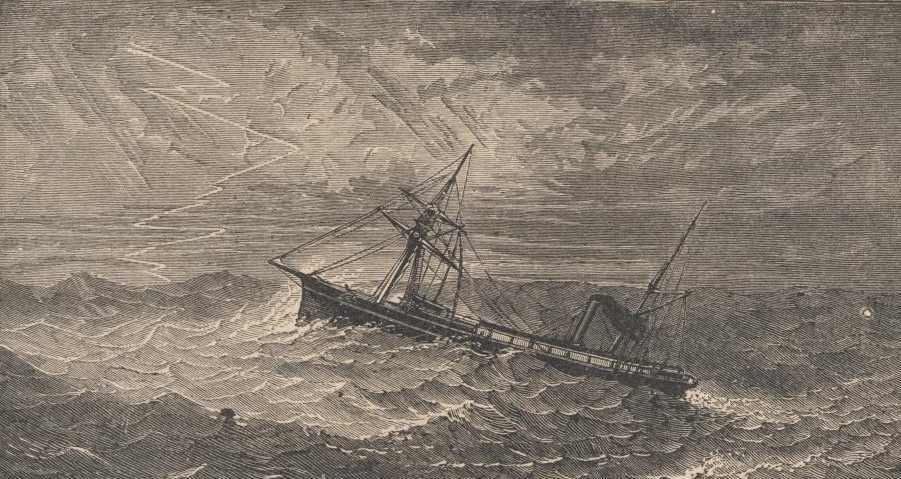
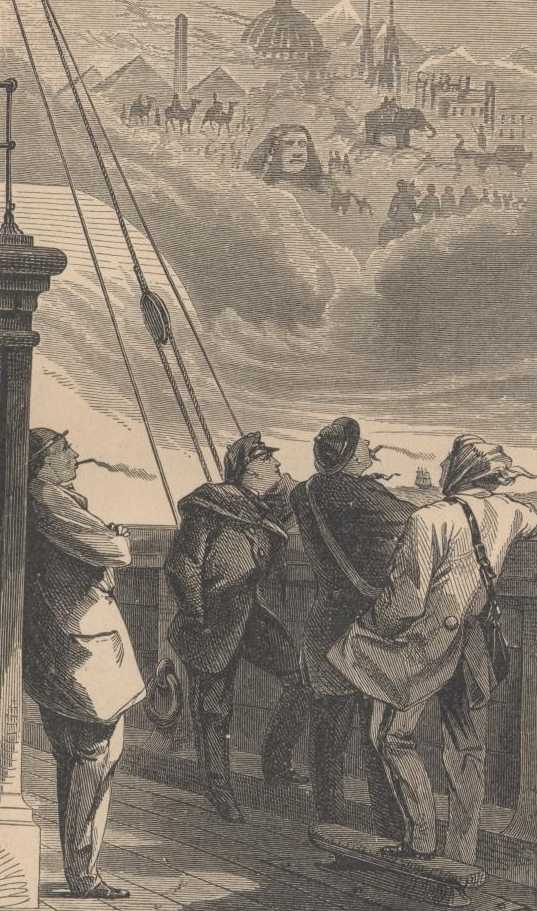


They pronounce it Pom-pay-e. I always had an idea that you went down
into Pompeii with torches, by the way of damp, dark stairways, just as
you do in silver mines, and traversed gloomy tunnels with lava overhead
and something on either hand like dilapidated prisons gouged out of the
solid earth, that faintly resembled houses. But you do nothing the kind.
Fully one-half of the buried city, perhaps, is completely exhumed and
thrown open freely to the light of day; and there stand the long rows of
solidly-built brick houses (roofless) just as they stood eighteen hundred
years ago, hot with the flaming sun; and there lie their floors,
clean-swept, and not a bright fragment tarnished or waiting of the labored
mosaics that pictured them with the beasts, and birds, and flowers which
we copy in perishable carpets to-day; and here are the Venuses, and
Bacchuses, and Adonises, making love and getting drunk in many-hued
frescoes on the walls of saloon and bed-chamber; and there are the narrow
streets and narrower sidewalks, paved with flags of good hard lava, the
one deeply rutted with the chariot-wheels, and the other with the passing
feet of the Pompeiians of by-gone centuries; and there are the
bake-shops, the temples, the halls of justice, the baths, the theatres—all
clean-scraped and neat, and suggesting nothing of the nature of a silver
mine away down in the bowels of the earth. The broken pillars lying
about, the doorless doorways and the crumbled tops of the wilderness of
walls, were wonderfully suggestive of the "burnt district" in one of our
cities, and if there had been any charred timbers, shattered windows,
heaps of debris, and general blackness and smokiness about the place, the
resemblance would have been perfect. But no—the sun shines as brightly
down on old Pompeii to-day as it did when Christ was born in Bethlehem,
and its streets are cleaner a hundred times than ever Pompeiian saw them
in her prime. I know whereof I speak—for in the great, chief
thoroughfares (Merchant street and the Street of Fortune) have I not seen
with my own eyes how for two hundred years at least the pavements were
not repaired!—how ruts five and even ten inches deep were worn into the
thick flagstones by the chariot-wheels of generations of swindled
tax-payers? And do I not know by these signs that Street Commissioners of
Pompeii never attended to their business, and that if they never mended
the pavements they never cleaned them? And, besides, is it not the
inborn nature of Street Commissioners to avoid their duty whenever they
get a chance? I wish I knew the name of the last one that held office in
Pompeii so that I could give him a blast. I speak with feeling on this
subject, because I caught my foot in one of those ruts, and the sadness
that came over me when I saw the first poor skeleton, with ashes and lava
sticking to it, was tempered by the reflection that may be that party was
the Street Commissioner.
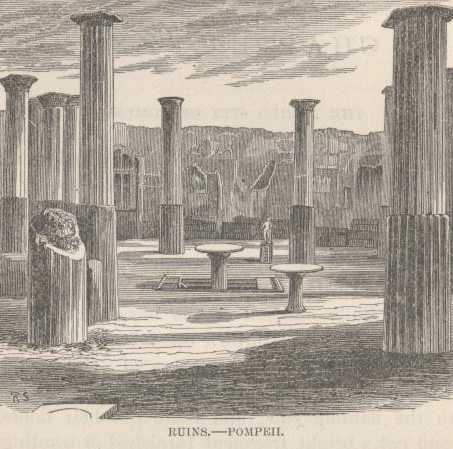
No—Pompeii is no longer a buried city. It is a city of hundreds and hundreds of roofless houses, and a tangled maze of streets where one could easily get lost, without a guide, and have to sleep in some ghostly palace that had known no living tenant since that awful November night of eighteen centuries ago.
We passed through the gate which faces the Mediterranean, (called the
"Marine Gate,") and by the rusty, broken image of Minerva, still keeping
tireless watch and ward over the possessions it was powerless to save,
and went up a long street and stood in the broad court of the Forum of
Justice. The floor was level and clean, and up and down either side was
a noble colonnade of broken pillars, with their beautiful Ionic and
Corinthian columns scattered about them. At the upper end were the
vacant seats of the Judges, and behind them we descended into a dungeon
where the ashes and cinders had found two prisoners chained on that
memorable November night, and tortured them to death. How they must have
tugged at the pitiless fetters as the fierce fires surged around them!
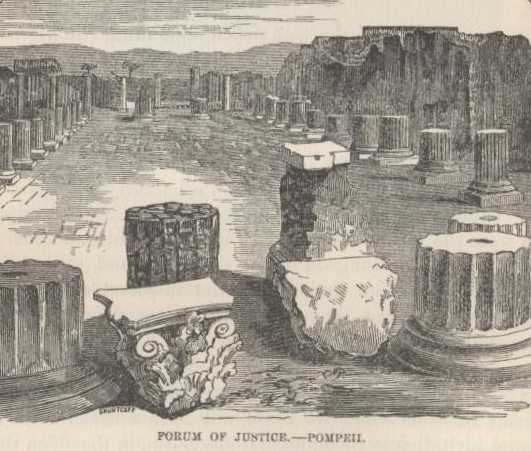
Then we lounged through many and many a sumptuous private mansion which we could not have entered without a formal invitation in incomprehensible Latin, in the olden time, when the owners lived there—and we probably wouldn't have got it. These people built their houses a good deal alike. The floors were laid in fanciful figures wrought in mosaics of many-colored marbles. At the threshold your eyes fall upon a Latin sentence of welcome, sometimes, or a picture of a dog, with the legend "Beware of the Dog," and sometimes a picture of a bear or a faun with no inscription at all. Then you enter a sort of vestibule, where they used to keep the hat-rack, I suppose; next a room with a large marble basin in the midst and the pipes of a fountain; on either side are bedrooms; beyond the fountain is a reception-room, then a little garden, dining-room, and so forth and so on. The floors were all mosaic, the walls were stuccoed, or frescoed, or ornamented with bas-reliefs, and here and there were statues, large and small, and little fish-pools, and cascades of sparkling water that sprang from secret places in the colonnade of handsome pillars that surrounded the court, and kept the flower-beds fresh and the air cool. Those Pompeiians were very luxurious in their tastes and habits. The most exquisite bronzes we have seen in Europe, came from the exhumed cities of Herculaneum and Pompeii, and also the finest cameos and the most delicate engravings on precious stones; their pictures, eighteen or nineteen centuries old, are often much more pleasing than the celebrated rubbish of the old masters of three centuries ago. They were well up in art. From the creation of these works of the first, clear up to the eleventh century, art seems hardly to have existed at all—at least no remnants of it are left—and it was curious to see how far (in some things, at any rate,) these old time pagans excelled the remote generations of masters that came after them. The pride of the world in sculptures seem to be the Laocoon and the Dying Gladiator, in Rome. They are as old as Pompeii, were dug from the earth like Pompeii; but their exact age or who made them can only be conjectured. But worn, and cracked, without a history, and with the blemishing stains of numberless centuries upon them, they still mutely mock at all efforts to rival their perfections.
It was a quaint and curious pastime, wandering through this old silent city of the dead—lounging through utterly deserted streets where thousands and thousands of human beings once bought and sold, and walked and rode, and made the place resound with the noise and confusion of traffic and pleasure. They were not lazy. They hurried in those days. We had evidence of that. There was a temple on one corner, and it was a shorter cut to go between the columns of that temple from one street to the other than to go around—and behold that pathway had been worn deep into the heavy flagstone floor of the building by generations of time-saving feet! They would not go around when it was quicker to go through. We do that way in our cities.
Every where, you see things that make you wonder how old these old houses
were before the night of destruction came—things, too, which bring back
those long dead inhabitants and place the living before your eyes. For
instance: The steps (two feet thick—lava blocks) that lead up out of the
school, and the same kind of steps that lead up into the dress circle of
the principal theatre, are almost worn through! For ages the boys
hurried out of that school, and for ages their parents hurried into that
theatre, and the nervous feet that have been dust and ashes for eighteen
centuries have left their record for us to read to-day. I imagined I
could see crowds of gentlemen and ladies thronging into the theatre, with
tickets for secured seats in their hands, and on the wall, I read the
imaginary placard, in infamous grammar, "POSITIVELY NO FREE LIST, EXCEPT
MEMBERS OF THE PRESS!" Hanging about the doorway (I fancied,) were
slouchy Pompeiian street-boys uttering slang and profanity, and keeping a
wary eye out for checks. I entered the theatre, and sat down in one of
the long rows of stone benches in the dress circle, and looked at the
place for the orchestra, and the ruined stage, and around at the wide
sweep of empty boxes, and thought to myself, "This house won't pay." I
tried to imagine the music in full blast, the leader of the orchestra
beating time, and the "versatile" So-and-So (who had "just returned from
a most successful tour in the provinces to play his last and farewell
engagement of positively six nights only, in Pompeii, previous to his
departure for Herculaneum,") charging around the stage and piling the
agony mountains high—but I could not do it with such a "house" as that;
those empty benches tied my fancy down to dull reality. I said, these
people that ought to be here have been dead, and still, and moldering to
dust for ages and ages, and will never care for the trifles and follies
of life any more for ever—"Owing to circumstances, etc., etc., there
will not be any performance to-night." Close down the curtain. Put out
the lights.
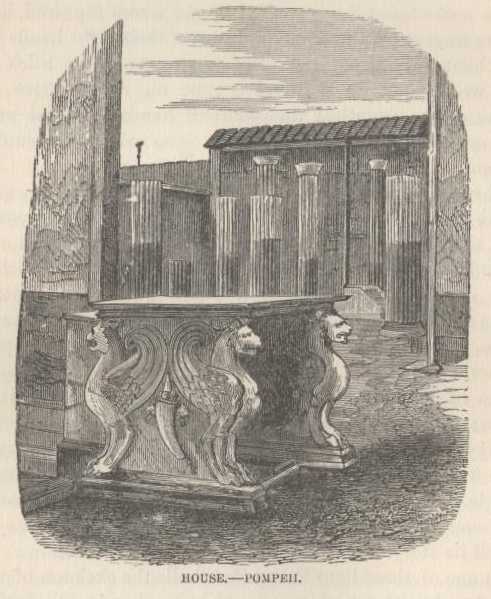
And so I turned away and went through shop after shop and store after store, far down the long street of the merchants, and called for the wares of Rome and the East, but the tradesmen were gone, the marts were silent, and nothing was left but the broken jars all set in cement of cinders and ashes: the wine and the oil that once had filled them were gone with their owners.
In a bake-shop was a mill for grinding the grain, and the furnaces for baking the bread: and they say that here, in the same furnaces, the exhumers of Pompeii found nice, well baked loaves which the baker had not found time to remove from the ovens the last time he left his shop, because circumstances compelled him to leave in such a hurry.
In one house (the only building in Pompeii which no woman is now allowed to enter,) were the small rooms and short beds of solid masonry, just as they were in the old times, and on the walls were pictures which looked almost as fresh as if they were painted yesterday, but which no pen could have the hardihood to describe; and here and there were Latin inscriptions—obscene scintillations of wit, scratched by hands that possibly were uplifted to Heaven for succor in the midst of a driving storm of fire before the night was done.
In one of the principal streets was a ponderous stone tank, and a water-spout that supplied it, and where the tired, heated toilers from the Campagna used to rest their right hands when they bent over to put their lips to the spout, the thick stone was worn down to a broad groove an inch or two deep. Think of the countless thousands of hands that had pressed that spot in the ages that are gone, to so reduce a stone that is as hard as iron!
They had a great public bulletin board in Pompeii—a place where announcements for gladiatorial combats, elections, and such things, were posted—not on perishable paper, but carved in enduring stone. One lady, who, I take it, was rich and well brought up, advertised a dwelling or so to rent, with baths and all the modern improvements, and several hundred shops, stipulating that the dwellings should not be put to immoral purposes. You can find out who lived in many a house in Pompeii by the carved stone door-plates affixed to them: and in the same way you can tell who they were that occupy the tombs. Every where around are things that reveal to you something of the customs and history of this forgotten people. But what would a volcano leave of an American city, if it once rained its cinders on it? Hardly a sign or a symbol to tell its story.
In one of these long Pompeiian halls the skeleton of a man was found, with ten pieces of gold in one hand and a large key in the other. He had seized his money and started toward the door, but the fiery tempest caught him at the very threshold, and he sank down and died. One more minute of precious time would have saved him. I saw the skeletons of a man, a woman, and two young girls. The woman had her hands spread wide apart, as if in mortal terror, and I imagined I could still trace upon her shapeless face something of the expression of wild despair that distorted it when the heavens rained fire in these streets, so many ages ago. The girls and the man lay with their faces upon their arms, as if they had tried to shield them from the enveloping cinders. In one apartment eighteen skeletons were found, all in sitting postures, and blackened places on the walls still mark their shapes and show their attitudes, like shadows. One of them, a woman, still wore upon her skeleton throat a necklace, with her name engraved upon it—JULIE DI DIOMEDE.
But perhaps the most poetical thing Pompeii has yielded to modern research, was that grand figure of a Roman soldier, clad in complete armor; who, true to his duty, true to his proud name of a soldier of Rome, and full of the stern courage which had given to that name its glory, stood to his post by the city gate, erect and unflinching, till the hell that raged around him burned out the dauntless spirit it could not conquer.
We never read of Pompeii but we think of that soldier; we can not write of Pompeii without the natural impulse to grant to him the mention he so well deserves. Let us remember that he was a soldier—not a policeman—and so, praise him. Being a soldier, he staid,—because the warrior instinct forbade him to fly. Had he been a policeman he would have staid, also—because he would have been asleep.
There are not half a dozen flights of stairs in Pompeii, and no other evidences that the houses were more than one story high. The people did not live in the clouds, as do the Venetians, the Genoese and Neapolitans of to-day.
We came out from under the solemn mysteries of this city of the Venerable Past—this city which perished, with all its old ways and its quaint old fashions about it, remote centuries ago, when the Disciples were preaching the new religion, which is as old as the hills to us now—and went dreaming among the trees that grow over acres and acres of its still buried streets and squares, till a shrill whistle and the cry of "All aboard—last train for Naples!" woke me up and reminded me that I belonged in the nineteenth century, and was not a dusty mummy, caked with ashes and cinders, eighteen hundred years old. The transition was startling. The idea of a railroad train actually running to old dead Pompeii, and whistling irreverently, and calling for passengers in the most bustling and business-like way, was as strange a thing as one could imagine, and as unpoetical and disagreeable as it was strange.
Compare the cheerful life and the sunshine of this day with the horrors the younger Pliny saw here, the 9th of November, A.D. 79, when he was so bravely striving to remove his mother out of reach of harm, while she begged him, with all a mother's unselfishness, to leave her to perish and save himself.
'By this time the murky darkness had so increased that one might have believed himself abroad in a black and moonless night, or in a chamber where all the lights had been extinguished. On every hand was heard the complaints of women, the wailing of children, and the cries of men. One called his father, another his son, and another his wife, and only by their voices could they know each other. Many in their despair begged that death would come and end their distress.
"Some implored the gods to succor them, and some believed that this night was the last, the eternal night which should engulf the universe!
"Even so it seemed to me—and I consoled myself for the coming death with the reflection: BEHOLD, THE WORLD IS PASSING AWAY!"
* * * * * * * *
After browsing among the stately ruins of Rome, of Baiae, of Pompeii, and after glancing down the long marble ranks of battered and nameless imperial heads that stretch down the corridors of the Vatican, one thing strikes me with a force it never had before: the unsubstantial, unlasting character of fame. Men lived long lives, in the olden time, and struggled feverishly through them, toiling like slaves, in oratory, in generalship, or in literature, and then laid them down and died, happy in the possession of an enduring history and a deathless name. Well, twenty little centuries flutter away, and what is left of these things? A crazy inscription on a block of stone, which snuffy antiquaries bother over and tangle up and make nothing out of but a bare name (which they spell wrong)—no history, no tradition, no poetry—nothing that can give it even a passing interest. What may be left of General Grant's great name forty centuries hence? This—in the Encyclopedia for A. D. 5868, possibly:
"URIAH S. (or Z.) GRAUNT—popular poet of ancient times in the Aztec provinces of the United States of British America. Some authors say flourished about A. D. 742; but the learned Ah-ah Foo-foo states that he was a cotemporary of Scharkspyre, the English poet, and flourished about A. D. 1328, some three centuries after the Trojan war instead of before it. He wrote 'Rock me to Sleep, Mother.'"
These thoughts sadden me. I will to bed.
Home, again! For the first time, in many weeks, the ship's entire family met and shook hands on the quarter-deck. They had gathered from many points of the compass and from many lands, but not one was missing; there was no tale of sickness or death among the flock to dampen the pleasure of the reunion. Once more there was a full audience on deck to listen to the sailors' chorus as they got the anchor up, and to wave an adieu to the land as we sped away from Naples. The seats were full at dinner again, the domino parties were complete, and the life and bustle on the upper deck in the fine moonlight at night was like old times—old times that had been gone weeks only, but yet they were weeks so crowded with incident, adventure and excitement, that they seemed almost like years. There was no lack of cheerfulness on board the Quaker City. For once, her title was a misnomer.
At seven in the evening, with the western horizon all golden from the
sunken sun, and specked with distant ships, the full moon sailing high
over head, the dark blue of the sea under foot, and a strange sort of
twilight affected by all these different lights and colors around us and
about us, we sighted superb Stromboli. With what majesty the monarch
held his lonely state above the level sea! Distance clothed him in a
purple gloom, and added a veil of shimmering mist that so softened his
rugged features that we seemed to see him through a web of silver gauze.
His torch was out; his fires were smoldering; a tall column of smoke that
rose up and lost itself in the growing moonlight was all the sign he gave
that he was a living Autocrat of the Sea and not the spectre of a dead
one.
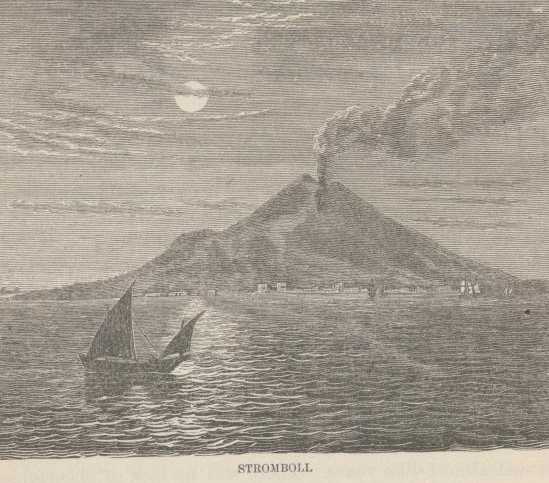
At two in the morning we swept through the Straits of Messina, and so bright was the moonlight that Italy on the one hand and Sicily on the other seemed almost as distinctly visible as though we looked at them from the middle of a street we were traversing. The city of Messina, milk-white, and starred and spangled all over with gaslights, was a fairy spectacle. A great party of us were on deck smoking and making a noise, and waiting to see famous Scylla and Charybdis. And presently the Oracle stepped out with his eternal spy-glass and squared himself on the deck like another Colossus of Rhodes. It was a surprise to see him abroad at such an hour. Nobody supposed he cared anything about an old fable like that of Scylla and Charybdis. One of the boys said:
"Hello, doctor, what are you doing up here at this time of night?—What do you want to see this place for?"
"What do I want to see this place for? Young man, little do you know me, or you wouldn't ask such a question. I wish to see all the places that's mentioned in the Bible."
"Stuff—this place isn't mentioned in the Bible."
"It ain't mentioned in the Bible!—this place ain't—well now, what place is this, since you know so much about it?"
"Why it's Scylla and Charybdis."
"Scylla and Cha—confound it, I thought it was Sodom and Gomorrah!"
And he closed up his glass and went below. The above is the ship story. Its plausibility is marred a little by the fact that the Oracle was not a biblical student, and did not spend much of his time instructing himself about Scriptural localities.—They say the Oracle complains, in this hot weather, lately, that the only beverage in the ship that is passable, is the butter. He did not mean butter, of course, but inasmuch as that article remains in a melted state now since we are out of ice, it is fair to give him the credit of getting one long word in the right place, anyhow, for once in his life. He said, in Rome, that the Pope was a noble-looking old man, but he never did think much of his Iliad.
We spent one pleasant day skirting along the Isles of Greece. They are very mountainous. Their prevailing tints are gray and brown, approaching to red. Little white villages surrounded by trees, nestle in the valleys or roost upon the lofty perpendicular sea-walls.
We had one fine sunset—a rich carmine flush that suffused the western sky and cast a ruddy glow far over the sea.—Fine sunsets seem to be rare in this part of the world—or at least, striking ones. They are soft, sensuous, lovely—they are exquisite refined, effeminate, but we have seen no sunsets here yet like the gorgeous conflagrations that flame in the track of the sinking sun in our high northern latitudes.
But what were sunsets to us, with the wild excitement upon us of approaching the most renowned of cities! What cared we for outward visions, when Agamemnon, Achilles, and a thousand other heroes of the great Past were marching in ghostly procession through our fancies? What were sunsets to us, who were about to live and breathe and walk in actual Athens; yea, and go far down into the dead centuries and bid in person for the slaves, Diogenes and Plato, in the public market-place, or gossip with the neighbors about the siege of Troy or the splendid deeds of Marathon? We scorned to consider sunsets.
We arrived, and entered the ancient harbor of the Piraeus at last. We dropped anchor within half a mile of the village. Away off, across the undulating Plain of Attica, could be seen a little square-topped hill with a something on it, which our glasses soon discovered to be the ruined edifices of the citadel of the Athenians, and most prominent among them loomed the venerable Parthenon. So exquisitely clear and pure is this wonderful atmosphere that every column of the noble structure was discernible through the telescope, and even the smaller ruins about it assumed some semblance of shape. This at a distance of five or six miles. In the valley, near the Acropolis, (the square-topped hill before spoken of,) Athens itself could be vaguely made out with an ordinary lorgnette. Every body was anxious to get ashore and visit these classic localities as quickly as possible. No land we had yet seen had aroused such universal interest among the passengers.
But bad news came. The commandant of the Piraeus came in his boat, and said we must either depart or else get outside the harbor and remain imprisoned in our ship, under rigid quarantine, for eleven days! So we took up the anchor and moved outside, to lie a dozen hours or so, taking in supplies, and then sail for Constantinople. It was the bitterest disappointment we had yet experienced. To lie a whole day in sight of the Acropolis, and yet be obliged to go away without visiting Athens! Disappointment was hardly a strong enough word to describe the circumstances.
All hands were on deck, all the afternoon, with books and maps and
glasses, trying to determine which "narrow rocky ridge" was the
Areopagus, which sloping hill the Pnyx, which elevation the Museum Hill,
and so on. And we got things confused. Discussion became heated, and
party spirit ran high. Church members were gazing with emotion upon a
hill which they said was the one St. Paul preached from, and another
faction claimed that that hill was Hymettus, and another that it was
Pentelicon! After all the trouble, we could be certain of only one
thing—the square-topped hill was the Acropolis, and the grand ruin that
crowned it was the Parthenon, whose picture we knew in infancy in the
school books.
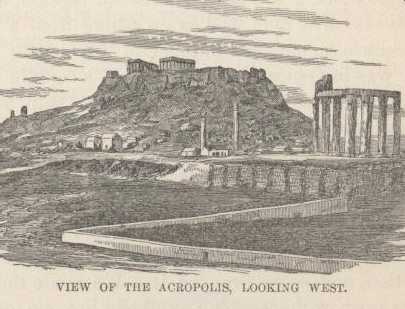
We inquired of every body who came near the ship, whether there were guards in the Piraeus, whether they were strict, what the chances were of capture should any of us slip ashore, and in case any of us made the venture and were caught, what would be probably done to us? The answers were discouraging: There was a strong guard or police force; the Piraeus was a small town, and any stranger seen in it would surely attract attention—capture would be certain. The commandant said the punishment would be "heavy;" when asked "how heavy?" he said it would be "very severe"—that was all we could get out of him.
At eleven o'clock at night, when most of the ship's company were abed, four of us stole softly ashore in a small boat, a clouded moon favoring the enterprise, and started two and two, and far apart, over a low hill, intending to go clear around the Piraeus, out of the range of its police. Picking our way so stealthily over that rocky, nettle-grown eminence, made me feel a good deal as if I were on my way somewhere to steal something. My immediate comrade and I talked in an undertone about quarantine laws and their penalties, but we found nothing cheering in the subject. I was posted. Only a few days before, I was talking with our captain, and he mentioned the case of a man who swam ashore from a quarantined ship somewhere, and got imprisoned six months for it; and when he was in Genoa a few years ago, a captain of a quarantined ship went in his boat to a departing ship, which was already outside of the harbor, and put a letter on board to be taken to his family, and the authorities imprisoned him three months for it, and then conducted him and his ship fairly to sea, and warned him never to show himself in that port again while he lived. This kind of conversation did no good, further than to give a sort of dismal interest to our quarantine-breaking expedition, and so we dropped it. We made the entire circuit of the town without seeing any body but one man, who stared at us curiously, but said nothing, and a dozen persons asleep on the ground before their doors, whom we walked among and never woke—but we woke up dogs enough, in all conscience—we always had one or two barking at our heels, and several times we had as many as ten and twelve at once. They made such a preposterous din that persons aboard our ship said they could tell how we were progressing for a long time, and where we were, by the barking of the dogs. The clouded moon still favored us. When we had made the whole circuit, and were passing among the houses on the further side of the town, the moon came out splendidly, but we no longer feared the light. As we approached a well, near a house, to get a drink, the owner merely glanced at us and went within. He left the quiet, slumbering town at our mercy. I record it here proudly, that we didn't do any thing to it.
Seeing no road, we took a tall hill to the left of the distant Acropolis for a mark, and steered straight for it over all obstructions, and over a little rougher piece of country than exists any where else outside of the State of Nevada, perhaps. Part of the way it was covered with small, loose stones—we trod on six at a time, and they all rolled. Another part of it was dry, loose, newly-ploughed ground. Still another part of it was a long stretch of low grape-vines, which were tanglesome and troublesome, and which we took to be brambles. The Attic Plain, barring the grape-vines, was a barren, desolate, unpoetical waste—I wonder what it was in Greece's Age of Glory, five hundred years before Christ?
In the neighborhood of one o'clock in the morning, when we were heated
with fast walking and parched with thirst, Denny exclaimed, "Why, these
weeds are grape-vines!" and in five minutes we had a score of bunches of
large, white, delicious grapes, and were reaching down for more when a
dark shape rose mysteriously up out of the shadows beside us and said
"Ho!" And so we left.
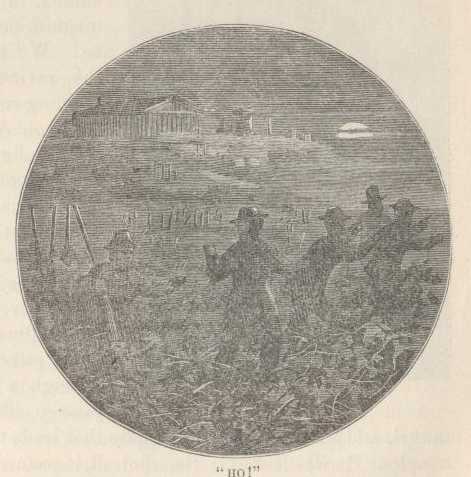
In ten minutes more we struck into a beautiful road, and unlike some others we had stumbled upon at intervals, it led in the right direction. We followed it. It was broad, and smooth, and white—handsome and in perfect repair, and shaded on both sides for a mile or so with single ranks of trees, and also with luxuriant vineyards. Twice we entered and stole grapes, and the second time somebody shouted at us from some invisible place. Whereupon we left again. We speculated in grapes no more on that side of Athens.
Shortly we came upon an ancient stone aqueduct, built upon arches, and
from that time forth we had ruins all about us—we were approaching our
journey's end. We could not see the Acropolis now or the high hill,
either, and I wanted to follow the road till we were abreast of them, but
the others overruled me, and we toiled laboriously up the stony hill
immediately in our front—and from its summit saw another—climbed it and
saw another! It was an hour of exhausting work. Soon we came upon a row
of open graves, cut in the solid rock—(for a while one of them served
Socrates for a prison)—we passed around the shoulder of the hill, and
the citadel, in all its ruined magnificence, burst upon us! We hurried
across the ravine and up a winding road, and stood on the old Acropolis,
with the prodigious walls of the citadel towering above our heads. We
did not stop to inspect their massive blocks of marble, or measure their
height, or guess at their extraordinary thickness, but passed at once
through a great arched passage like a railway tunnel, and went straight
to the gate that leads to the ancient temples. It was locked! So, after
all, it seemed that we were not to see the great Parthenon face to face.
We sat down and held a council of war. Result: the gate was only a
flimsy structure of wood—we would break it down. It seemed like
desecration, but then we had traveled far, and our necessities were
urgent. We could not hunt up guides and keepers—we must be on the ship
before daylight. So we argued. This was all very fine, but when we came
to break the gate, we could not do it. We moved around an angle of the
wall and found a low bastion—eight feet high without—ten or twelve
within. Denny prepared to scale it, and we got ready to follow. By dint
of hard scrambling he finally straddled the top, but some loose stones
crumbled away and fell with a crash into the court within. There was
instantly a banging of doors and a shout. Denny dropped from the wall in
a twinkling, and we retreated in disorder to the gate. Xerxes took that
mighty citadel four hundred and eighty years before Christ, when his five
millions of soldiers and camp-followers followed him to Greece, and if we
four Americans could have remained unmolested five minutes longer, we
would have taken it too.
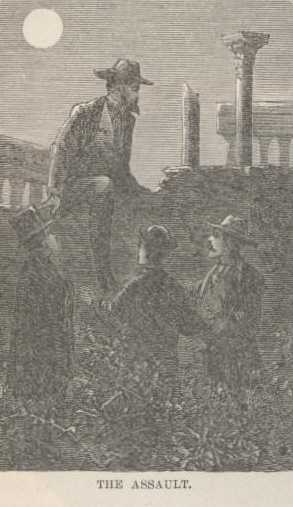
The garrison had turned out—four Greeks. We clamored at the gate, and they admitted us. [Bribery and corruption.]
We crossed a large court, entered a great door, and stood upon a pavement of purest white marble, deeply worn by footprints. Before us, in the flooding moonlight, rose the noblest ruins we had ever looked upon—the Propylae; a small Temple of Minerva; the Temple of Hercules, and the grand Parthenon. [We got these names from the Greek guide, who didn't seem to know more than seven men ought to know.] These edifices were all built of the whitest Pentelic marble, but have a pinkish stain upon them now. Where any part is broken, however, the fracture looks like fine loaf sugar. Six caryatides, or marble women, clad in flowing robes, support the portico of the Temple of Hercules, but the porticos and colonnades of the other structures are formed of massive Doric and Ionic pillars, whose flutings and capitals are still measurably perfect, notwithstanding the centuries that have gone over them and the sieges they have suffered. The Parthenon, originally, was two hundred and twenty-six feet long, one hundred wide, and seventy high, and had two rows of great columns, eight in each, at either end, and single rows of seventeen each down the sides, and was one of the most graceful and beautiful edifices ever erected.
Most of the Parthenon's imposing columns are still standing, but the roof is gone. It was a perfect building two hundred and fifty years ago, when a shell dropped into the Venetian magazine stored here, and the explosion which followed wrecked and unroofed it. I remember but little about the Parthenon, and I have put in one or two facts and figures for the use of other people with short memories. Got them from the guide-book.
As we wandered thoughtfully down the marble-paved length of this stately temple, the scene about us was strangely impressive. Here and there, in lavish profusion, were gleaming white statues of men and women, propped against blocks of marble, some of them armless, some without legs, others headless—but all looking mournful in the moonlight, and startlingly human! They rose up and confronted the midnight intruder on every side—they stared at him with stony eyes from unlooked-for nooks and recesses; they peered at him over fragmentary heaps far down the desolate corridors; they barred his way in the midst of the broad forum, and solemnly pointed with handless arms the way from the sacred fane; and through the roofless temple the moon looked down, and banded the floor and darkened the scattered fragments and broken statues with the slanting shadows of the columns.
What a world of ruined sculpture was about us! Set up in rows—stacked
up in piles—scattered broadcast over the wide area of the
Acropolis—were hundreds of crippled statues of all sizes and of the most exquisite
workmanship; and vast fragments of marble that once belonged to the
entablatures, covered with bas-reliefs representing battles and sieges,
ships of war with three and four tiers of oars, pageants and
processions—every thing one could think of. History says that the temples of the
Acropolis were filled with the noblest works of Praxiteles and Phidias,
and of many a great master in sculpture besides—and surely these elegant
fragments attest it.
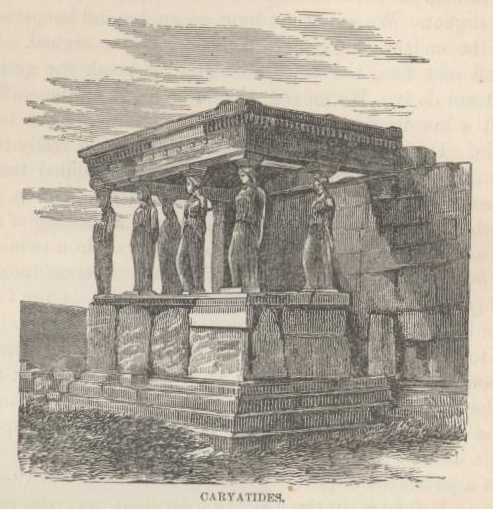
We walked out into the grass-grown, fragment-strewn court beyond the Parthenon. It startled us, every now and then, to see a stony white face stare suddenly up at us out of the grass with its dead eyes. The place seemed alive with ghosts. I half expected to see the Athenian heroes of twenty centuries ago glide out of the shadows and steal into the old temple they knew so well and regarded with such boundless pride.
The full moon was riding high in the cloudless heavens, now. We sauntered carelessly and unthinkingly to the edge of the lofty battlements of the citadel, and looked down—a vision! And such a vision! Athens by moonlight! The prophet that thought the splendors of the New Jerusalem were revealed to him, surely saw this instead! It lay in the level plain right under our feet—all spread abroad like a picture—and we looked down upon it as we might have looked from a balloon. We saw no semblance of a street, but every house, every window, every clinging vine, every projection was as distinct and sharply marked as if the time were noon-day; and yet there was no glare, no glitter, nothing harsh or repulsive—the noiseless city was flooded with the mellowest light that ever streamed from the moon, and seemed like some living creature wrapped in peaceful slumber. On its further side was a little temple, whose delicate pillars and ornate front glowed with a rich lustre that chained the eye like a spell; and nearer by, the palace of the king reared its creamy walls out of the midst of a great garden of shrubbery that was flecked all over with a random shower of amber lights—a spray of golden sparks that lost their brightness in the glory of the moon, and glinted softly upon the sea of dark foliage like the pallid stars of the milky-way. Overhead the stately columns, majestic still in their ruin—under foot the dreaming city—in the distance the silver sea—not on the broad earth is there an other picture half so beautiful!
As we turned and moved again through the temple, I wished that the
illustrious men who had sat in it in the remote ages could visit it again
and reveal themselves to our curious eyes—Plato, Aristotle, Demosthenes,
Socrates, Phocion, Pythagoras, Euclid, Pindar, Xenophon, Herodotus,
Praxiteles and Phidias, Zeuxis the painter. What a constellation of
celebrated names! But more than all, I wished that old Diogenes, groping
so patiently with his lantern, searching so zealously for one solitary
honest man in all the world, might meander along and stumble on our
party. I ought not to say it, may be, but still I suppose he would have
put out his light.
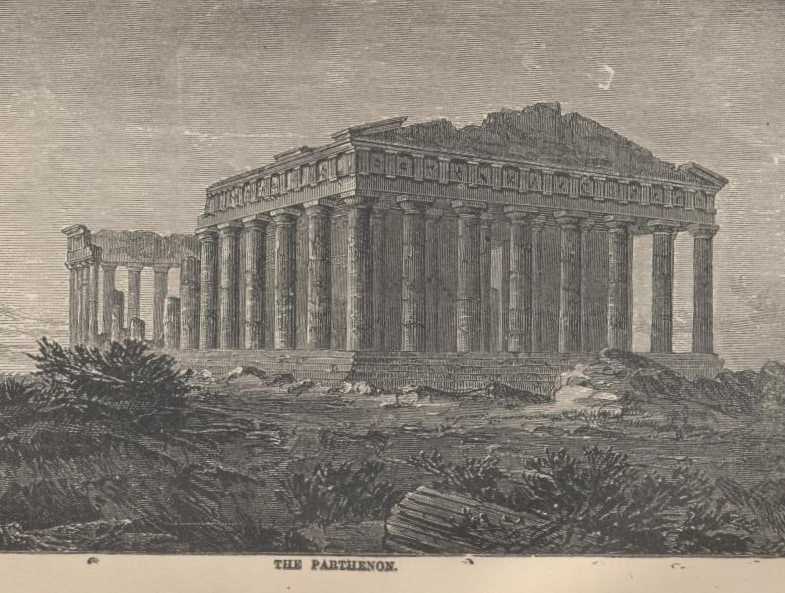
We left the Parthenon to keep its watch over old Athens, as it had kept it for twenty-three hundred years, and went and stood outside the walls of the citadel. In the distance was the ancient, but still almost perfect Temple of Theseus, and close by, looking to the west, was the Bema, from whence Demosthenes thundered his philippics and fired the wavering patriotism of his countrymen. To the right was Mars Hill, where the Areopagus sat in ancient times and where St. Paul defined his position, and below was the market-place where he "disputed daily" with the gossip-loving Athenians. We climbed the stone steps St. Paul ascended, and stood in the square-cut place he stood in, and tried to recollect the Bible account of the matter—but for certain reasons, I could not recall the words. I have found them since:
"Now while Paul waited for them at Athens, his spirit was stirred in him, when he saw the city wholly given up to idolatry. Therefore disputed he in the synagogue with the Jews, and with the devout persons, and in the market daily with them that met with him. * * * * * * * * *
"And they took him and brought him unto Areopagus, saying, May we know what this new doctrine whereof thou speakest is? * * * * * * * * *
"Then Paul stood in the midst of Mars hill, and said, Ye men of Athens, I perceive that in all things ye are too superstitious; For as I passed by and beheld your devotions, I found an altar with this inscription: To THE UNKNOWN GOD. Whom, therefore, ye ignorantly worship, him declare I unto you."—Acts, ch. xvii."
It occurred to us, after a while, that if we wanted to get home before daylight betrayed us, we had better be moving. So we hurried away. When far on our road, we had a parting view of the Parthenon, with the moonlight streaming through its open colonnades and touching its capitals with silver. As it looked then, solemn, grand, and beautiful it will always remain in our memories.
As we marched along, we began to get over our fears, and ceased to care much about quarantine scouts or any body else. We grew bold and reckless; and once, in a sudden burst of courage, I even threw a stone at a dog. It was a pleasant reflection, though, that I did not hit him, because his master might just possibly have been a policeman. Inspired by this happy failure, my valor became utterly uncontrollable, and at intervals I absolutely whistled, though on a moderate key. But boldness breeds boldness, and shortly I plunged into a Vineyard, in the full light of the moon, and captured a gallon of superb grapes, not even minding the presence of a peasant who rode by on a mule. Denny and Birch followed my example.
Now I had grapes enough for a dozen, but then Jackson was all swollen up
with courage, too, and he was obliged to enter a vineyard presently. The
first bunch he seized brought trouble. A frowsy, bearded brigand
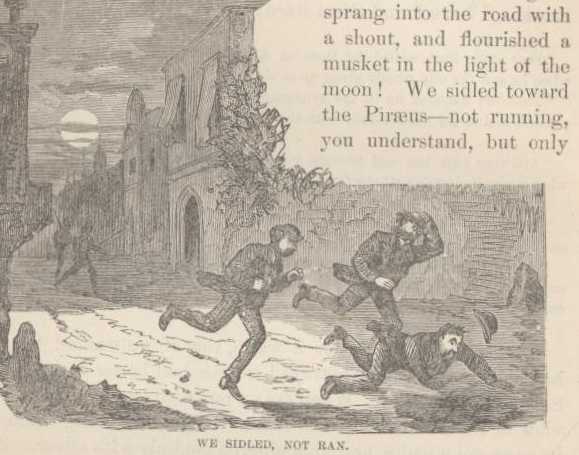
advancing with celerity. The brigand shouted again, but still we advanced. It was getting late, and we had no time to fool away on every ass that wanted to drivel Greek platitudes to us. We would just as soon have talked with him as not if we had not been in a hurry. Presently Denny said, "Those fellows are following us!"
We turned, and, sure enough, there they were—three fantastic pirates armed with guns. We slackened our pace to let them come up, and in the meantime I got out my cargo of grapes and dropped them firmly but reluctantly into the shadows by the wayside. But I was not afraid. I only felt that it was not right to steal grapes. And all the more so when the owner was around—and not only around, but with his friends around also. The villains came up and searched a bundle Dr. Birch had in his hand, and scowled upon him when they found it had nothing in it but some holy rocks from Mars Hill, and these were not contraband. They evidently suspected him of playing some wretched fraud upon them, and seemed half inclined to scalp the party. But finally they dismissed us with a warning, couched in excellent Greek, I suppose, and dropped tranquilly in our wake. When they had gone three hundred yards they stopped, and we went on rejoiced. But behold, another armed rascal came out of the shadows and took their place, and followed us two hundred yards. Then he delivered us over to another miscreant, who emerged from some mysterious place, and he in turn to another! For a mile and a half our rear was guarded all the while by armed men. I never traveled in so much state before in all my life.
It was a good while after that before we ventured to steal any more grapes, and when we did we stirred up another troublesome brigand, and then we ceased all further speculation in that line. I suppose that fellow that rode by on the mule posted all the sentinels, from Athens to the Piraeus, about us.
Every field on that long route was watched by an armed sentinel, some of
whom had fallen asleep, no doubt, but were on hand, nevertheless. This
shows what sort of a country modern Attica is—a community of
questionable characters. These men were not there to guard their
possessions against strangers, but against each other; for strangers
seldom visit Athens and the Piraeus, and when they do, they go in
daylight, and can buy all the grapes they want for a trifle. The modern
inhabitants are confiscators and falsifiers of high repute, if gossip
speaks truly concerning them, and I freely believe it does.
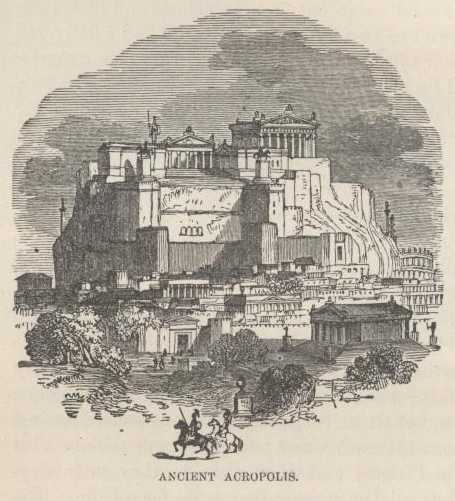
Just as the earliest tinges of the dawn flushed the eastern sky and turned the pillared Parthenon to a broken harp hung in the pearly horizon, we closed our thirteenth mile of weary, round-about marching, and emerged upon the sea-shore abreast the ships, with our usual escort of fifteen hundred Piraean dogs howling at our heels. We hailed a boat that was two or three hundred yards from shore, and discovered in a moment that it was a police-boat on the lookout for any quarantine-breakers that might chance to be abroad. So we dodged—we were used to that by this time—and when the scouts reached the spot we had so lately occupied, we were absent. They cruised along the shore, but in the wrong direction, and shortly our own boat issued from the gloom and took us aboard. They had heard our signal on the ship. We rowed noiselessly away, and before the police-boat came in sight again, we were safe at home once more.
Four more of our passengers were anxious to visit Athens, and started half an hour after we returned; but they had not been ashore five minutes till the police discovered and chased them so hotly that they barely escaped to their boat again, and that was all. They pursued the enterprise no further.
We set sail for Constantinople to-day, but some of us little care for that. We have seen all there was to see in the old city that had its birth sixteen hundred years before Christ was born, and was an old town before the foundations of Troy were laid—and saw it in its most attractive aspect. Wherefore, why should we worry?
Two other passengers ran the blockade successfully last night. So we
learned this morning. They slipped away so quietly that they were not
missed from the ship for several hours. They had the hardihood to march
into the Piraeus in the early dusk and hire a carriage. They ran some
danger of adding two or three months' imprisonment to the other novelties
of their Holy Land Pleasure Excursion. I admire "cheek."—[Quotation
from the Pilgrims.]—But they went and came safely, and never walked a
step.
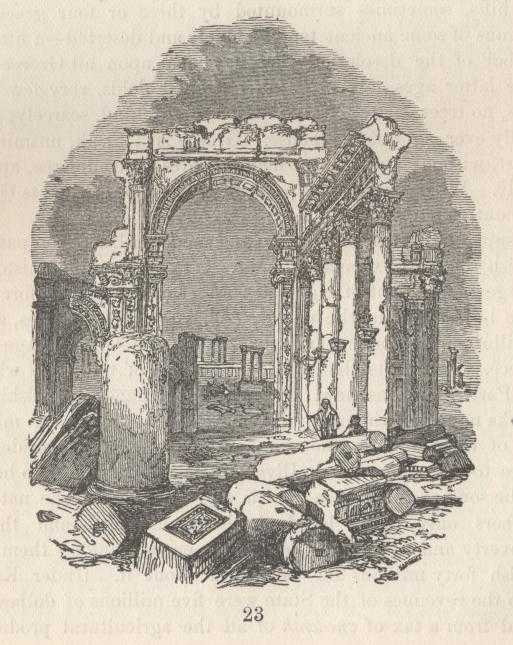
From Athens all through the islands of the Grecian Archipelago, we saw
little but forbidding sea-walls and barren hills, sometimes surmounted by
three or four graceful columns of some ancient temple, lonely and
deserted—a fitting symbol of the desolation that has come upon all
Greece in these latter ages. We saw no ploughed fields, very few
villages, no trees or grass or vegetation of any kind, scarcely, and
hardly ever an isolated house. Greece is a bleak, unsmiling desert,
without agriculture, manufactures or commerce, apparently. What supports
its poverty-stricken people or its Government, is a mystery.

I suppose that ancient Greece and modern Greece compared, furnish the most extravagant contrast to be found in history. George I., an infant of eighteen, and a scraggy nest of foreign office holders, sit in the places of Themistocles, Pericles, and the illustrious scholars and generals of the Golden Age of Greece. The fleets that were the wonder of the world when the Parthenon was new, are a beggarly handful of fishing-smacks now, and the manly people that performed such miracles of valor at Marathon are only a tribe of unconsidered slaves to-day. The classic Illyssus has gone dry, and so have all the sources of Grecian wealth and greatness. The nation numbers only eight hundred thousand souls, and there is poverty and misery and mendacity enough among them to furnish forty millions and be liberal about it. Under King Otho the revenues of the State were five millions of dollars—raised from a tax of one-tenth of all the agricultural products of the land (which tenth the farmer had to bring to the royal granaries on pack-mules any distance not exceeding six leagues) and from extravagant taxes on trade and commerce. Out of that five millions the small tyrant tried to keep an army of ten thousand men, pay all the hundreds of useless Grand Equerries in Waiting, First Grooms of the Bedchamber, Lord High Chancellors of the Exploded Exchequer, and all the other absurdities which these puppy-kingdoms indulge in, in imitation of the great monarchies; and in addition he set about building a white marble palace to cost about five millions itself. The result was, simply: ten into five goes no times and none over. All these things could not be done with five millions, and Otho fell into trouble.
The Greek throne, with its unpromising adjuncts of a ragged population of
ingenious rascals who were out of employment eight months in the year
because there was little for them to borrow and less to confiscate, and a
waste of barren hills and weed-grown deserts, went begging for a good
while. It was offered to one of Victoria's sons, and afterwards to
various other younger sons of royalty who had no thrones and were out of
business, but they all had the charity to decline the dreary honor, and
veneration enough for Greece's ancient greatness to refuse to mock her
sorrowful rags and dirt with a tinsel throne in this day of her
humiliation—till they came to this young Danish George, and he took it.
He has finished the splendid palace I saw in the radiant moonlight the
other night, and is doing many other things for the salvation of Greece,
they say.
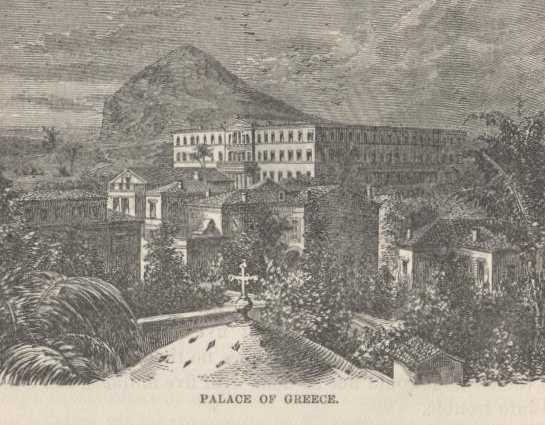
We sailed through the barren Archipelago, and into the narrow channel they sometimes call the Dardanelles and sometimes the Hellespont. This part of the country is rich in historic reminiscences, and poor as Sahara in every thing else. For instance, as we approached the Dardanelles, we coasted along the Plains of Troy and past the mouth of the Scamander; we saw where Troy had stood (in the distance,) and where it does not stand now—a city that perished when the world was young. The poor Trojans are all dead, now. They were born too late to see Noah's ark, and died too soon to see our menagerie. We saw where Agamemnon's fleets rendezvoused, and away inland a mountain which the map said was Mount Ida. Within the Hellespont we saw where the original first shoddy contract mentioned in history was carried out, and the "parties of the second part" gently rebuked by Xerxes. I speak of the famous bridge of boats which Xerxes ordered to be built over the narrowest part of the Hellespont (where it is only two or three miles wide.) A moderate gale destroyed the flimsy structure, and the King, thinking that to publicly rebuke the contractors might have a good effect on the next set, called them out before the army and had them beheaded. In the next ten minutes he let a new contract for the bridge. It has been observed by ancient writers that the second bridge was a very good bridge. Xerxes crossed his host of five millions of men on it, and if it had not been purposely destroyed, it would probably have been there yet. If our Government would rebuke some of our shoddy contractors occasionally, it might work much good. In the Hellespont we saw where Leander and Lord Byron swam across, the one to see her upon whom his soul's affections were fixed with a devotion that only death could impair, and the other merely for a flyer, as Jack says. We had two noted tombs near us, too. On one shore slept Ajax, and on the other Hecuba.
We had water batteries and forts on both sides of the Hellespont, flying the crimson flag of Turkey, with its white crescent, and occasionally a village, and sometimes a train of camels; we had all these to look at till we entered the broad sea of Marmora, and then the land soon fading from view, we resumed euchre and whist once more.
We dropped anchor in the mouth of the Golden Horn at daylight in the morning. Only three or four of us were up to see the great Ottoman capital. The passengers do not turn out at unseasonable hours, as they used to, to get the earliest possible glimpse of strange foreign cities. They are well over that. If we were lying in sight of the Pyramids of Egypt, they would not come on deck until after breakfast, now-a-days.
The Golden Horn is a narrow arm of the sea, which branches from the Bosporus (a sort of broad river which connects the Marmora and Black Seas,) and, curving around, divides the city in the middle. Galata and Pera are on one side of the Bosporus, and the Golden Horn; Stamboul (ancient Byzantium) is upon the other. On the other bank of the Bosporus is Scutari and other suburbs of Constantinople. This great city contains a million inhabitants, but so narrow are its streets, and so crowded together are its houses, that it does not cover much more than half as much ground as New York City. Seen from the anchorage or from a mile or so up the Bosporus, it is by far the handsomest city we have seen. Its dense array of houses swells upward from the water's edge, and spreads over the domes of many hills; and the gardens that peep out here and there, the great globes of the mosques, and the countless minarets that meet the eye every where, invest the metropolis with the quaint Oriental aspect one dreams of when he reads books of eastern travel. Constantinople makes a noble picture.
But its attractiveness begins and ends with its picturesqueness. From
the time one starts ashore till he gets back again, he execrates it. The
boat he goes in is admirably miscalculated for the service it is built
for. It is handsomely and neatly fitted up, but no man could handle it
well in the turbulent currents that sweep down the Bosporus from the
Black Sea, and few men could row it satisfactorily even in still water.
It is a long, light canoe (caique,) large at one end and tapering to a
knife blade at the other. They make that long sharp end the bow, and you
can imagine how these boiling currents spin it about. It has two oars,
and sometimes four, and no rudder. You start to go to a given point and
you run in fifty different directions before you get there. First one
oar is backing water, and then the other; it is seldom that both are
going ahead at once. This kind of boating is calculated to drive an
impatient man mad in a week. The boatmen are the awkwardest, the
stupidest, and the most unscientific on earth, without question.
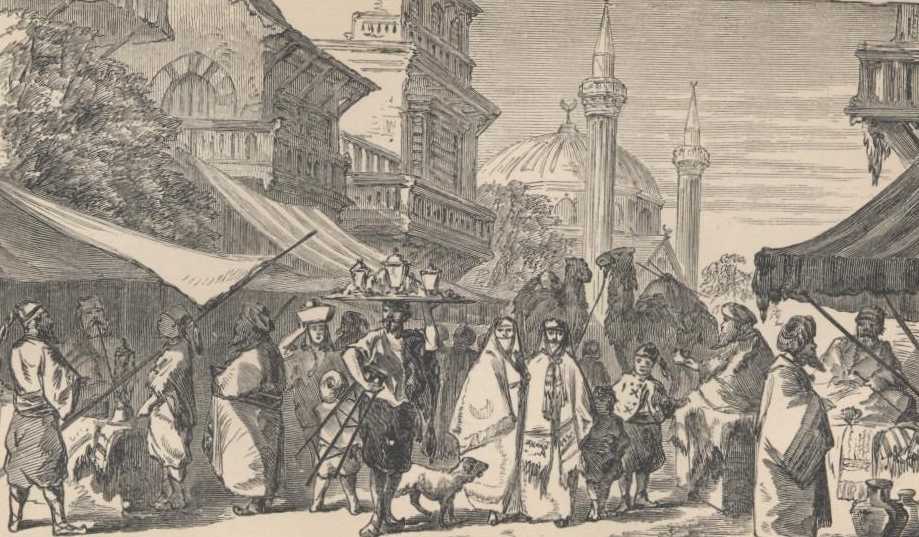
Ashore, it was—well, it was an eternal circus. People were thicker than bees, in those narrow streets, and the men were dressed in all the outrageous, outlandish, idolatrous, extravagant, thunder-and-lightning costumes that ever a tailor with the delirium tremens and seven devils could conceive of. There was no freak in dress too crazy to be indulged in; no absurdity too absurd to be tolerated; no frenzy in ragged diabolism too fantastic to be attempted. No two men were dressed alike. It was a wild masquerade of all imaginable costumes—every struggling throng in every street was a dissolving view of stunning contrasts. Some patriarchs wore awful turbans, but the grand mass of the infidel horde wore the fiery red skull-cap they call a fez. All the remainder of the raiment they indulged in was utterly indescribable.
The shops here are mere coops, mere boxes, bath-rooms, closets—any thing you please to call them—on the first floor. The Turks sit cross-legged in them, and work and trade and smoke long pipes, and smell like—like Turks. That covers the ground. Crowding the narrow streets in front of them are beggars, who beg forever, yet never collect any thing; and wonderful cripples, distorted out of all semblance of humanity, almost; vagabonds driving laden asses; porters carrying dry-goods boxes as large as cottages on their backs; peddlers of grapes, hot corn, pumpkin seeds, and a hundred other things, yelling like fiends; and sleeping happily, comfortably, serenely, among the hurrying feet, are the famed dogs of Constantinople; drifting noiselessly about are squads of Turkish women, draped from chin to feet in flowing robes, and with snowy veils bound about their heads, that disclose only the eyes and a vague, shadowy notion of their features. Seen moving about, far away in the dim, arched aisles of the Great Bazaar, they look as the shrouded dead must have looked when they walked forth from their graves amid the storms and thunders and earthquakes that burst upon Calvary that awful night of the Crucifixion. A street in Constantinople is a picture which one ought to see once—not oftener.
And then there was the goose-rancher—a fellow who drove a hundred geese
before him about the city, and tried to sell them. He had a pole ten
feet long, with a crook in the end of it, and occasionally a goose would
branch out from the flock and make a lively break around the corner, with
wings half lifted and neck stretched to its utmost. Did the
goose-merchant get excited? No. He took his pole and reached after that goose
with unspeakable sang froid—took a hitch round his neck, and "yanked"
him back to his place in the flock without an effort. He steered his
geese with that stick as easily as another man would steer a yawl. A few
hours afterward we saw him sitting on a stone at a corner, in the midst
of the turmoil, sound asleep in the sun, with his geese squatting around
him, or dodging out of the way of asses and men. We came by again,
within the hour, and he was taking account of stock, to see whether any
of his flock had strayed or been stolen. The way he did it was unique.
He put the end of his stick within six or eight inches of a stone wall,
and made the geese march in single file between it and the wall. He
counted them as they went by. There was no dodging that arrangement.
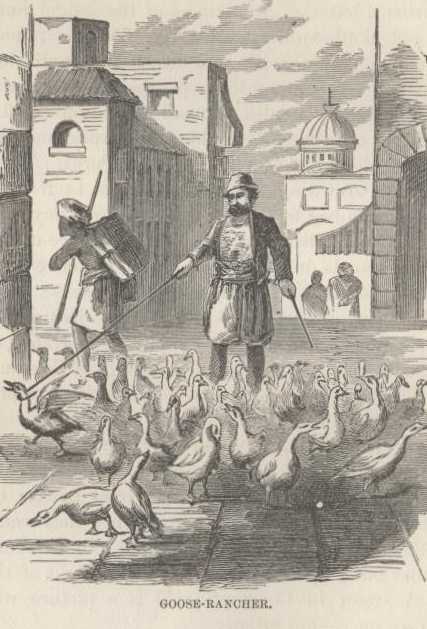
If you want dwarfs—I mean just a few dwarfs for a curiosity—go to Genoa. If you wish to buy them by the gross, for retail, go to Milan. There are plenty of dwarfs all over Italy, but it did seem to me that in Milan the crop was luxuriant. If you would see a fair average style of assorted cripples, go to Naples, or travel through the Roman States. But if you would see the very heart and home of cripples and human monsters, both, go straight to Constantinople. A beggar in Naples who can show a foot which has all run into one horrible toe, with one shapeless nail on it, has a fortune—but such an exhibition as that would not provoke any notice in Constantinople. The man would starve. Who would pay any attention to attractions like his among the rare monsters that throng the bridges of the Golden Horn and display their deformities in the gutters of Stamboul? O, wretched impostor! How could he stand against the three-legged woman, and the man with his eye in his cheek? How would he blush in presence of the man with fingers on his elbow? Where would he hide himself when the dwarf with seven fingers on each hand, no upper lip, and his under-jaw gone, came down in his majesty? Bismillah! The cripples of Europe are a delusion and a fraud. The truly gifted flourish only in the by-ways of Pera and Stamboul.
That three-legged woman lay on the bridge, with her stock in trade so disposed as to command the most striking effect—one natural leg, and two long, slender, twisted ones with feet on them like somebody else's fore-arm. Then there was a man further along who had no eyes, and whose face was the color of a fly-blown beefsteak, and wrinkled and twisted like a lava-flow—and verily so tumbled and distorted were his features that no man could tell the wart that served him for a nose from his cheek-bones. In Stamboul was a man with a prodigious head, an uncommonly long body, legs eight inches long and feet like snow-shoes. He traveled on those feet and his hands, and was as sway-backed as if the Colossus of Rhodes had been riding him. Ah, a beggar has to have exceedingly good points to make a living in Constantinople. A blue-faced man, who had nothing to offer except that he had been blown up in a mine, would be regarded as a rank impostor, and a mere damaged soldier on crutches would never make a cent. It would pay him to get apiece of his head taken off, and cultivate a wen like a carpet sack.
The Mosque of St. Sophia is the chief lion of Constantinople. You must get a firman and hurry there the first thing. We did that. We did not get a firman, but we took along four or five francs apiece, which is much the same thing.
I do not think much of the Mosque of St. Sophia. I suppose I lack
appreciation. We will let it go at that. It is the rustiest old barn in
heathendom. I believe all the interest that attaches to it comes from
the fact that it was built for a Christian church and then turned into a
mosque, without much alteration, by the Mohammedan conquerors of the
land. They made me take off my boots and walk into the place in my
stocking-feet. I caught cold, and got myself so stuck up with a
complication of gums, slime and general corruption, that I wore out more
than two thousand pair of boot-jacks getting my boots off that night, and
even then some Christian hide peeled off with them. I abate not a single
boot-jack.
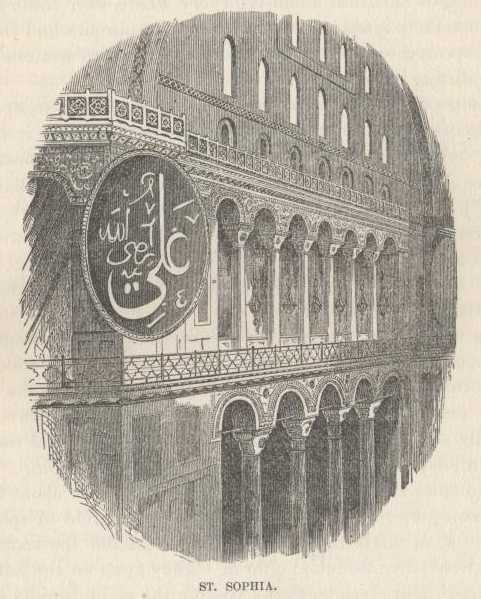
St. Sophia is a colossal church, thirteen or fourteen hundred years old, and unsightly enough to be very, very much older. Its immense dome is said to be more wonderful than St. Peter's, but its dirt is much more wonderful than its dome, though they never mention it. The church has a hundred and seventy pillars in it, each a single piece, and all of costly marbles of various kinds, but they came from ancient temples at Baalbec, Heliopolis, Athens and Ephesus, and are battered, ugly and repulsive. They were a thousand years old when this church was new, and then the contrast must have been ghastly—if Justinian's architects did not trim them any. The inside of the dome is figured all over with a monstrous inscription in Turkish characters, wrought in gold mosaic, that looks as glaring as a circus bill; the pavements and the marble balustrades are all battered and dirty; the perspective is marred every where by a web of ropes that depend from the dizzy height of the dome, and suspend countless dingy, coarse oil lamps, and ostrich-eggs, six or seven feet above the floor. Squatting and sitting in groups, here and there and far and near, were ragged Turks reading books, hearing sermons, or receiving lessons like children. And in fifty places were more of the same sort bowing and straightening up, bowing again and getting down to kiss the earth, muttering prayers the while, and keeping up their gymnastics till they ought to have been tired, if they were not.
Every where was dirt, and dust, and dinginess, and gloom; every where were signs of a hoary antiquity, but with nothing touching or beautiful about it; every where were those groups of fantastic pagans; overhead the gaudy mosaics and the web of lamp-ropes—nowhere was there any thing to win one's love or challenge his admiration.
The people who go into ecstasies over St. Sophia must surely get them out of the guide-book (where every church is spoken of as being "considered by good judges to be the most marvelous structure, in many respects, that the world has ever seen.") Or else they are those old connoisseurs from the wilds of New Jersey who laboriously learn the difference between a fresco and a fire-plug and from that day forward feel privileged to void their critical bathos on painting, sculpture and architecture forever more.
We visited the Dancing Dervishes. There were twenty-one of them. They wore a long, light-colored loose robe that hung to their heels. Each in his turn went up to the priest (they were all within a large circular railing) and bowed profoundly and then went spinning away deliriously and took his appointed place in the circle, and continued to spin. When all had spun themselves to their places, they were about five or six feet apart—and so situated, the entire circle of spinning pagans spun itself three separate times around the room. It took twenty-five minutes to do it. They spun on the left foot, and kept themselves going by passing the right rapidly before it and digging it against the waxed floor. Some of them made incredible "time." Most of them spun around forty times in a minute, and one artist averaged about sixty-one times a minute, and kept it up during the whole twenty-five. His robe filled with air and stood out all around him like a balloon.
They made no noise of any kind, and most of them tilted their heads back and closed their eyes, entranced with a sort of devotional ecstacy. There was a rude kind of music, part of the time, but the musicians were not visible. None but spinners were allowed within the circle. A man had to either spin or stay outside. It was about as barbarous an exhibition as we have witnessed yet. Then sick persons came and lay down, and beside them women laid their sick children (one a babe at the breast,) and the patriarch of the Dervishes walked upon their bodies. He was supposed to cure their diseases by trampling upon their breasts or backs or standing on the back of their necks. This is well enough for a people who think all their affairs are made or marred by viewless spirits of the air—by giants, gnomes, and genii—and who still believe, to this day, all the wild tales in the Arabian Nights. Even so an intelligent missionary tells me.
We visited the Thousand and One Columns. I do not know what it was originally intended for, but they said it was built for a reservoir. It is situated in the centre of Constantinople. You go down a flight of stone steps in the middle of a barren place, and there you are. You are forty feet under ground, and in the midst of a perfect wilderness of tall, slender, granite columns, of Byzantine architecture. Stand where you would, or change your position as often as you pleased, you were always a centre from which radiated a dozen long archways and colonnades that lost themselves in distance and the sombre twilight of the place. This old dried-up reservoir is occupied by a few ghostly silk-spinners now, and one of them showed me a cross cut high up in one of the pillars. I suppose he meant me to understand that the institution was there before the Turkish occupation, and I thought he made a remark to that effect; but he must have had an impediment in his speech, for I did not understand him.
We took off our shoes and went into the marble mausoleum of the Sultan
Mahmoud, the neatest piece of architecture, inside, that I have seen
lately. Mahmoud's tomb was covered with a black velvet pall, which was
elaborately embroidered with silver; it stood within a fancy silver
railing; at the sides and corners were silver candlesticks that would
weigh more than a hundred pounds, and they supported candles as large as
a man's leg; on the top of the sarcophagus was a fez, with a handsome
diamond ornament upon it, which an attendant said cost a hundred thousand
pounds, and lied like a Turk when he said it. Mahmoud's whole family
were comfortably planted around him.
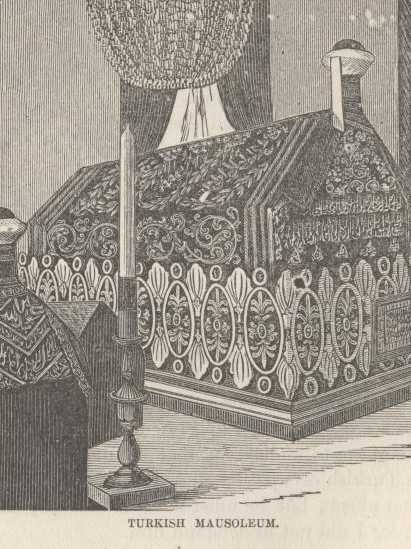
We went to the great Bazaar in Stamboul, of course, and I shall not describe it further than to say it is a monstrous hive of little shops—thousands, I should say—all under one roof, and cut up into innumerable little blocks by narrow streets which are arched overhead. One street is devoted to a particular kind of merchandise, another to another, and so on.
When you wish to buy a pair of shoes you have the swing of the whole
street—you do not have to walk yourself down hunting stores in different
localities. It is the same with silks, antiquities, shawls, etc. The
place is crowded with people all the time, and as the gay-colored Eastern
fabrics are lavishly displayed before every shop, the great Bazaar of
Stamboul is one of the sights that are worth seeing. It is full of life,
and stir, and business, dirt, beggars, asses, yelling peddlers, porters,
dervishes, high-born Turkish female shoppers, Greeks, and weird-looking
and weirdly dressed Mohammedans from the mountains and the far
provinces—and the only solitary thing one does not smell when he is in the Great
Bazaar, is something which smells good.
Mosques are plenty, churches are plenty, graveyards are plenty, but morals and whiskey are scarce. The Koran does not permit Mohammedans to drink. Their natural instincts do not permit them to be moral. They say the Sultan has eight hundred wives. This almost amounts to bigamy. It makes our cheeks burn with shame to see such a thing permitted here in Turkey. We do not mind it so much in Salt Lake, however.
Circassian and Georgian girls are still sold in Constantinople by their parents, but not publicly. The great slave marts we have all read so much about—where tender young girls were stripped for inspection, and criticised and discussed just as if they were horses at an agricultural fair—no longer exist. The exhibition and the sales are private now. Stocks are up, just at present, partly because of a brisk demand created by the recent return of the Sultan's suite from the courts of Europe; partly on account of an unusual abundance of bread-stuffs, which leaves holders untortured by hunger and enables them to hold back for high prices; and partly because buyers are too weak to bear the market, while sellers are amply prepared to bull it. Under these circumstances, if the American metropolitan newspapers were published here in Constantinople, their next commercial report would read about as follows, I suppose:
SLAVE GIRL MARKET REPORT.
"Best brands Circassians, crop of 1850, L200; 1852, L250; 1854, L300.
Best brands Georgian, none in market; second quality, 1851, L180.
Nineteen fair to middling Wallachian girls offered at L130 @150,
but no takers; sixteen prime A 1 sold in small lots to close out—terms private.
"Sales of one lot Circassians, prime to good, 1852 to 1854, at L240
@ 242, buyer 30; one forty-niner—damaged—at L23, seller ten, no
deposit. Several Georgians, fancy brands, 1852, changed hands to
fill orders. The Georgians now on hand are mostly last year's crop,
which was unusually poor. The new crop is a little backward, but
will be coming in shortly. As regards its quantity and quality, the
accounts are most encouraging. In this connection we can safely
say, also, that the new crop of Circassians is looking extremely
well. His Majesty the Sultan has already sent in large orders for
his new harem, which will be finished within a fortnight, and this
has naturally strengthened the market and given Circassian stock a
strong upward tendency. Taking advantage of the inflated market,
many of our shrewdest operators are selling short. There are hints
of a "corner" on Wallachians.
"There is nothing new in Nubians. Slow sale.
"Eunuchs—None offering; however, large cargoes are expected from
Egypt today."
I think the above would be about the style of the commercial report. Prices are pretty high now, and holders firm; but, two or three years ago, parents in a starving condition brought their young daughters down here and sold them for even twenty and thirty dollars, when they could do no better, simply to save themselves and the girls from dying of want. It is sad to think of so distressing a thing as this, and I for one am sincerely glad the prices are up again.
Commercial morals, especially, are bad. There is no gainsaying that. Greek, Turkish and Armenian morals consist only in attending church regularly on the appointed Sabbaths, and in breaking the ten commandments all the balance of the week. It comes natural to them to lie and cheat in the first place, and then they go on and improve on nature until they arrive at perfection. In recommending his son to a merchant as a valuable salesman, a father does not say he is a nice, moral, upright boy, and goes to Sunday School and is honest, but he says, "This boy is worth his weight in broad pieces of a hundred—for behold, he will cheat whomsoever hath dealings with him, and from the Euxine to the waters of Marmora there abideth not so gifted a liar!" How is that for a recommendation? The Missionaries tell me that they hear encomiums like that passed upon people every day. They say of a person they admire, "Ah, he is a charming swindler, and a most exquisite liar!"
Every body lies and cheats—every body who is in business, at any rate. Even foreigners soon have to come down to the custom of the country, and they do not buy and sell long in Constantinople till they lie and cheat like a Greek. I say like a Greek, because the Greeks are called the worst transgressors in this line. Several Americans long resident in Constantinople contend that most Turks are pretty trustworthy, but few claim that the Greeks have any virtues that a man can discover—at least without a fire assay.
I am half willing to believe that the celebrated dogs of Constantinople
have been misrepresented—slandered. I have always been led to suppose
that they were so thick in the streets that they blocked the way; that
they moved about in organized companies, platoons and regiments, and took
what they wanted by determined and ferocious assault; and that at night
they drowned all other sounds with their terrible howlings. The dogs I
see here can not be those I have read of.
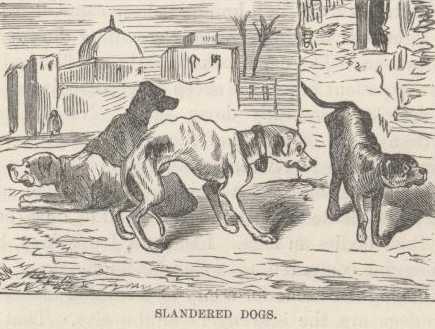
I find them every where, but not in strong force. The most I have found together has been about ten or twenty. And night or day a fair proportion of them were sound asleep. Those that were not asleep always looked as if they wanted to be. I never saw such utterly wretched, starving, sad-visaged, broken-hearted looking curs in my life. It seemed a grim satire to accuse such brutes as these of taking things by force of arms. They hardly seemed to have strength enough or ambition enough to walk across the street—I do not know that I have seen one walk that far yet. They are mangy and bruised and mutilated, and often you see one with the hair singed off him in such wide and well defined tracts that he looks like a map of the new Territories. They are the sorriest beasts that breathe—the most abject—the most pitiful. In their faces is a settled expression of melancholy, an air of hopeless despondency. The hairless patches on a scalded dog are preferred by the fleas of Constantinople to a wider range on a healthier dog; and the exposed places suit the fleas exactly. I saw a dog of this kind start to nibble at a flea—a fly attracted his attention, and he made a snatch at him; the flea called for him once more, and that forever unsettled him; he looked sadly at his flea-pasture, then sadly looked at his bald spot. Then he heaved a sigh and dropped his head resignedly upon his paws. He was not equal to the situation.
The dogs sleep in the streets, all over the city. From one end of the street to the other, I suppose they will average about eight or ten to a block. Sometimes, of course, there are fifteen or twenty to a block. They do not belong to any body, and they seem to have no close personal friendships among each other. But they district the city themselves, and the dogs of each district, whether it be half a block in extent, or ten blocks, have to remain within its bounds. Woe to a dog if he crosses the line! His neighbors would snatch the balance of his hair off in a second. So it is said. But they don't look it.
They sleep in the streets these days. They are my compass—my guide. When I see the dogs sleep placidly on, while men, sheep, geese, and all moving things turn out and go around them, I know I am not in the great street where the hotel is, and must go further. In the Grand Rue the dogs have a sort of air of being on the lookout—an air born of being obliged to get out of the way of many carriages every day—and that expression one recognizes in a moment. It does not exist upon the face of any dog without the confines of that street. All others sleep placidly and keep no watch. They would not move, though the Sultan himself passed by.
In one narrow street (but none of them are wide) I saw three dogs lying coiled up, about a foot or two apart. End to end they lay, and so they just bridged the street neatly, from gutter to gutter. A drove of a hundred sheep came along. They stepped right over the dogs, the rear crowding the front, impatient to get on. The dogs looked lazily up, flinched a little when the impatient feet of the sheep touched their raw backs—sighed, and lay peacefully down again. No talk could be plainer than that. So some of the sheep jumped over them and others scrambled between, occasionally chipping a leg with their sharp hoofs, and when the whole flock had made the trip, the dogs sneezed a little, in the cloud of dust, but never budged their bodies an inch. I thought I was lazy, but I am a steam-engine compared to a Constantinople dog. But was not that a singular scene for a city of a million inhabitants?
These dogs are the scavengers of the city. That is their official position, and a hard one it is. However, it is their protection. But for their usefulness in partially cleansing these terrible streets, they would not be tolerated long. They eat any thing and every thing that comes in their way, from melon rinds and spoiled grapes up through all the grades and species of dirt and refuse to their own dead friends and relatives—and yet they are always lean, always hungry, always despondent. The people are loath to kill them—do not kill them, in fact. The Turks have an innate antipathy to taking the life of any dumb animal, it is said. But they do worse. They hang and kick and stone and scald these wretched creatures to the very verge of death, and then leave them to live and suffer.
Once a Sultan proposed to kill off all the dogs here, and did begin the work—but the populace raised such a howl of horror about it that the massacre was stayed. After a while, he proposed to remove them all to an island in the Sea of Marmora. No objection was offered, and a ship-load or so was taken away. But when it came to be known that somehow or other the dogs never got to the island, but always fell overboard in the night and perished, another howl was raised and the transportation scheme was dropped.
So the dogs remain in peaceable possession of the streets. I do not say that they do not howl at night, nor that they do not attack people who have not a red fez on their heads. I only say that it would be mean for me to accuse them of these unseemly things who have not seen them do them with my own eyes or heard them with my own ears.
I was a little surprised to see Turks and Greeks playing newsboy right here in the mysterious land where the giants and genii of the Arabian Nights once dwelt—where winged horses and hydra-headed dragons guarded enchanted castles—where Princes and Princesses flew through the air on carpets that obeyed a mystic talisman—where cities whose houses were made of precious stones sprang up in a night under the hand of the magician, and where busy marts were suddenly stricken with a spell and each citizen lay or sat, or stood with weapon raised or foot advanced, just as he was, speechless and motionless, till time had told a hundred years!
It was curious to see newsboys selling papers in so dreamy a land as that. And, to say truly, it is comparatively a new thing here. The selling of newspapers had its birth in Constantinople about a year ago, and was a child of the Prussian and Austrian war.
There is one paper published here in the English language—The Levant
Herald—and there are generally a number of Greek and a few French papers
rising and falling, struggling up and falling again. Newspapers are not
popular with the Sultan's Government. They do not understand journalism.
The proverb says, "The unknown is always great." To the court, the
newspaper is a mysterious and rascally institution. They know what a
pestilence is, because they have one occasionally that thins the people
out at the rate of two thousand a day, and they regard a newspaper as a
mild form of pestilence. When it goes astray, they suppress it—pounce
upon it without warning, and throttle it. When it don't go astray for a
long time, they get suspicious and throttle it anyhow, because they think
it is hatching deviltry. Imagine the Grand Vizier in solemn council with
the magnates of the realm, spelling his way through the hated newspaper,
and finally delivering his profound decision: "This thing means
mischief—it is too darkly, too suspiciously inoffensive—suppress it! Warn the
publisher that we can not have this sort of thing: put the editor in
prison!"
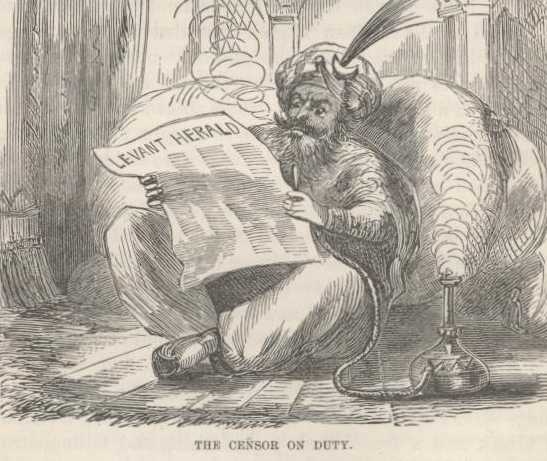
The newspaper business has its inconveniences in Constantinople. Two Greek papers and one French one were suppressed here within a few days of each other. No victories of the Cretans are allowed to be printed. From time to time the Grand Vizier sends a notice to the various editors that the Cretan insurrection is entirely suppressed, and although that editor knows better, he still has to print the notice. The Levant Herald is too fond of speaking praisefully of Americans to be popular with the Sultan, who does not relish our sympathy with the Cretans, and therefore that paper has to be particularly circumspect in order to keep out of trouble. Once the editor, forgetting the official notice in his paper that the Cretans were crushed out, printed a letter of a very different tenor, from the American Consul in Crete, and was fined two hundred and fifty dollars for it. Shortly he printed another from the same source and was imprisoned three months for his pains. I think I could get the assistant editorship of the Levant Herald, but I am going to try to worry along without it.
To suppress a paper here involves the ruin of the publisher, almost. But in Naples I think they speculate on misfortunes of that kind. Papers are suppressed there every day, and spring up the next day under a new name. During the ten days or a fortnight we staid there one paper was murdered and resurrected twice. The newsboys are smart there, just as they are elsewhere. They take advantage of popular weaknesses. When they find they are not likely to sell out, they approach a citizen mysteriously, and say in a low voice—"Last copy, sir: double price; paper just been suppressed!" The man buys it, of course, and finds nothing in it. They do say—I do not vouch for it—but they do say that men sometimes print a vast edition of a paper, with a ferociously seditious article in it, distribute it quickly among the newsboys, and clear out till the Government's indignation cools. It pays well. Confiscation don't amount to any thing. The type and presses are not worth taking care of.
There is only one English newspaper in Naples. It has seventy subscribers. The publisher is getting rich very deliberately—very deliberately indeed.
I never shall want another Turkish lunch. The cooking apparatus was in the little lunch room, near the bazaar, and it was all open to the street. The cook was slovenly, and so was the table, and it had no cloth on it. The fellow took a mass of sausage meat and coated it round a wire and laid it on a charcoal fire to cook. When it was done, he laid it aside and a dog walked sadly in and nipped it. He smelt it first, and probably recognized the remains of a friend. The cook took it away from him and laid it before us. Jack said, "I pass"—he plays euchre sometimes—and we all passed in turn. Then the cook baked a broad, flat, wheaten cake, greased it well with the sausage, and started towards us with it. It dropped in the dirt, and he picked it up and polished it on his breeches, and laid it before us. Jack said, "I pass." We all passed. He put some eggs in a frying pan, and stood pensively prying slabs of meat from between his teeth with a fork. Then he used the fork to turn the eggs with—and brought them along. Jack said "Pass again." All followed suit. We did not know what to do, and so we ordered a new ration of sausage. The cook got out his wire, apportioned a proper amount of sausage-meat, spat it on his hands and fell to work! This time, with one accord, we all passed out. We paid and left. That is all I learned about Turkish lunches. A Turkish lunch is good, no doubt, but it has its little drawbacks.
When I think how I have been swindled by books of Oriental travel, I want a tourist for breakfast. For years and years I have dreamed of the wonders of the Turkish bath; for years and years I have promised myself that I would yet enjoy one. Many and many a time, in fancy, I have lain in the marble bath, and breathed the slumbrous fragrance of Eastern spices that filled the air; then passed through a weird and complicated system of pulling and hauling, and drenching and scrubbing, by a gang of naked savages who loomed vast and vaguely through the steaming mists, like demons; then rested for a while on a divan fit for a king; then passed through another complex ordeal, and one more fearful than the first; and, finally, swathed in soft fabrics, been conveyed to a princely saloon and laid on a bed of eider down, where eunuchs, gorgeous of costume, fanned me while I drowsed and dreamed, or contentedly gazed at the rich hangings of the apartment, the soft carpets, the sumptuous furniture, the pictures, and drank delicious coffee, smoked the soothing narghili, and dropped, at the last, into tranquil repose, lulled by sensuous odors from unseen censers, by the gentle influence of the narghili's Persian tobacco, and by the music of fountains that counterfeited the pattering of summer rain.
That was the picture, just as I got it from incendiary books of travel. It was a poor, miserable imposture. The reality is no more like it than the Five Points are like the Garden of Eden. They received me in a great court, paved with marble slabs; around it were broad galleries, one above another, carpeted with seedy matting, railed with unpainted balustrades, and furnished with huge rickety chairs, cushioned with rusty old mattresses, indented with impressions left by the forms of nine successive generations of men who had reposed upon them. The place was vast, naked, dreary; its court a barn, its galleries stalls for human horses. The cadaverous, half nude varlets that served in the establishment had nothing of poetry in their appearance, nothing of romance, nothing of Oriental splendor. They shed no entrancing odors—just the contrary. Their hungry eyes and their lank forms continually suggested one glaring, unsentimental fact—they wanted what they term in California "a square meal."
I went into one of the racks and undressed. An unclean starveling
wrapped a gaudy table-cloth about his loins, and hung a white rag over my
shoulders. If I had had a tub then, it would have come natural to me to
take in washing. I was then conducted down stairs into the wet, slippery
court, and the first things that attracted my attention were my heels.
My fall excited no comment. They expected it, no doubt. It belonged in
the list of softening, sensuous influences peculiar to this home of
Eastern luxury. It was softening enough, certainly, but its application
was not happy. They now gave me a pair of wooden clogs—benches in
miniature, with leather straps over them to confine my feet (which they
would have done, only I do not wear No. 13s.) These things dangled
uncomfortably by the straps when I lifted up my feet, and came down in
awkward and unexpected places when I put them on the floor again, and
sometimes turned sideways and wrenched my ankles out of joint. However,
it was all Oriental luxury, and I did what I could to enjoy it.
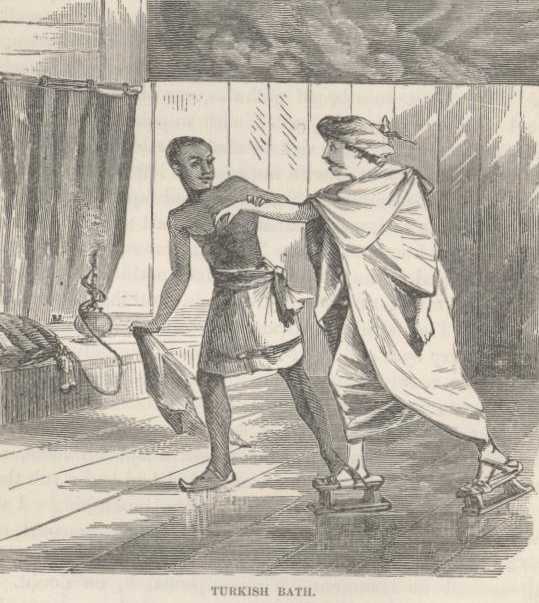
They put me in another part of the barn and laid me on a stuffy sort of pallet, which was not made of cloth of gold, or Persian shawls, but was merely the unpretending sort of thing I have seen in the negro quarters of Arkansas. There was nothing whatever in this dim marble prison but five more of these biers. It was a very solemn place. I expected that the spiced odors of Araby were going to steal over my senses now, but they did not. A copper-colored skeleton, with a rag around him, brought me a glass decanter of water, with a lighted tobacco pipe in the top of it, and a pliant stem a yard long, with a brass mouth-piece to it.
It was the famous "narghili" of the East—the thing the Grand Turk smokes in the pictures. This began to look like luxury. I took one blast at it, and it was sufficient; the smoke went in a great volume down into my stomach, my lungs, even into the uttermost parts of my frame. I exploded one mighty cough, and it was as if Vesuvius had let go. For the next five minutes I smoked at every pore, like a frame house that is on fire on the inside. Not any more narghili for me. The smoke had a vile taste, and the taste of a thousand infidel tongues that remained on that brass mouthpiece was viler still. I was getting discouraged. Whenever, hereafter, I see the cross-legged Grand Turk smoking his narghili, in pretended bliss, on the outside of a paper of Connecticut tobacco, I shall know him for the shameless humbug he is.
This prison was filled with hot air. When I had got warmed up sufficiently to prepare me for a still warmer temperature, they took me where it was—into a marble room, wet, slippery and steamy, and laid me out on a raised platform in the centre. It was very warm. Presently my man sat me down by a tank of hot water, drenched me well, gloved his hand with a coarse mitten, and began to polish me all over with it. I began to smell disagreeably. The more he polished the worse I smelt. It was alarming. I said to him:
"I perceive that I am pretty far gone. It is plain that I ought to be buried without any unnecessary delay. Perhaps you had better go after my friends at once, because the weather is warm, and I can not 'keep' long."
He went on scrubbing, and paid no attention. I soon saw that he was reducing my size. He bore hard on his mitten, and from under it rolled little cylinders, like maccaroni. It could not be dirt, for it was too white. He pared me down in this way for a long time. Finally I said:
"It is a tedious process. It will take hours to trim me to the size you want me; I will wait; go and borrow a jack-plane."
He paid no attention at all.
After a while he brought a basin, some soap, and something that seemed to be the tail of a horse. He made up a prodigious quantity of soap-suds, deluged me with them from head to foot, without warning me to shut my eyes, and then swabbed me viciously with the horse-tail. Then he left me there, a snowy statue of lather, and went away. When I got tired of waiting I went and hunted him up. He was propped against the wall, in another room, asleep. I woke him. He was not disconcerted. He took me back and flooded me with hot water, then turbaned my head, swathed me with dry table-cloths, and conducted me to a latticed chicken-coop in one of the galleries, and pointed to one of those Arkansas beds. I mounted it, and vaguely expected the odors of Araby a gain. They did not come.
The blank, unornamented coop had nothing about it of that oriental voluptuousness one reads of so much. It was more suggestive of the county hospital than any thing else. The skinny servitor brought a narghili, and I got him to take it out again without wasting any time about it. Then he brought the world-renowned Turkish coffee that poets have sung so rapturously for many generations, and I seized upon it as the last hope that was left of my old dreams of Eastern luxury. It was another fraud. Of all the unchristian beverages that ever passed my lips, Turkish coffee is the worst. The cup is small, it is smeared with grounds; the coffee is black, thick, unsavory of smell, and execrable in taste. The bottom of the cup has a muddy sediment in it half an inch deep. This goes down your throat, and portions of it lodge by the way, and produce a tickling aggravation that keeps you barking and coughing for an hour.
Here endeth my experience of the celebrated Turkish bath, and here also
endeth my dream of the bliss the mortal revels in who passes through it.
It is a malignant swindle. The man who enjoys it is qualified to enjoy
any thing that is repulsive to sight or sense, and he that can invest it
with a charm of poetry is able to do the same with any thing else in the
world that is tedious, and wretched, and dismal, and nasty.
We left a dozen passengers in Constantinople, and sailed through the
beautiful Bosporus and far up into the Black Sea. We left them in the
clutches of the celebrated Turkish guide, "FAR-AWAY MOSES," who will
seduce them into buying a ship-load of ottar of roses, splendid Turkish
vestments, and all manner of curious things they can never have any use
for.
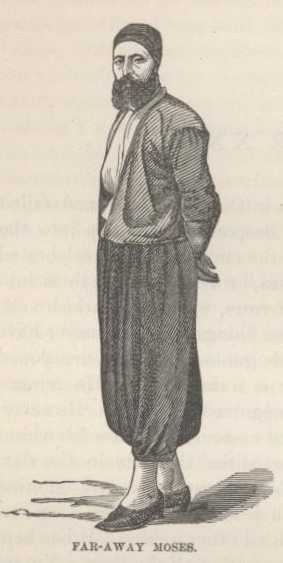
Murray's invaluable guide-books have mentioned 'Far-away Moses' name, and he is a made man. He rejoices daily in the fact that he is a recognized celebrity. However, we can not alter our established customs to please the whims of guides; we can not show partialities this late in the day. Therefore, ignoring this fellow's brilliant fame, and ignoring the fanciful name he takes such pride in, we called him Ferguson, just as we had done with all other guides. It has kept him in a state of smothered exasperation all the time. Yet we meant him no harm. After he has gotten himself up regardless of expense, in showy, baggy trowsers, yellow, pointed slippers, fiery fez, silken jacket of blue, voluminous waist-sash of fancy Persian stuff filled with a battery of silver-mounted horse-pistols, and has strapped on his terrible scimitar, he considers it an unspeakable humiliation to be called Ferguson. It can not be helped. All guides are Fergusons to us. We can not master their dreadful foreign names.
Sebastopol is probably the worst battered town in Russia or any where else. But we ought to be pleased with it, nevertheless, for we have been in no country yet where we have been so kindly received, and where we felt that to be Americans was a sufficient visa for our passports. The moment the anchor was down, the Governor of the town immediately dispatched an officer on board to inquire if he could be of any assistance to us, and to invite us to make ourselves at home in Sebastopol! If you know Russia, you know that this was a wild stretch of hospitality. They are usually so suspicious of strangers that they worry them excessively with the delays and aggravations incident to a complicated passport system. Had we come from any other country we could not have had permission to enter Sebastopol and leave again under three days—but as it was, we were at liberty to go and come when and where we pleased. Every body in Constantinople warned us to be very careful about our passports, see that they were strictly 'en regle', and never to mislay them for a moment: and they told us of numerous instances of Englishmen and others who were delayed days, weeks, and even months, in Sebastopol, on account of trifling informalities in their passports, and for which they were not to blame. I had lost my passport, and was traveling under my room-mate's, who stayed behind in Constantinople to await our return. To read the description of him in that passport and then look at me, any man could see that I was no more like him than I am like Hercules. So I went into the harbor of Sebastopol with fear and trembling—full of a vague, horrible apprehension that I was going to be found out and hanged. But all that time my true passport had been floating gallantly overhead—and behold it was only our flag. They never asked us for any other.
We have had a great many Russian and English gentlemen and ladies on board to-day, and the time has passed cheerfully away. They were all happy-spirited people, and I never heard our mother tongue sound so pleasantly as it did when it fell from those English lips in this far-off land. I talked to the Russians a good deal, just to be friendly, and they talked to me from the same motive; I am sure that both enjoyed the conversation, but never a word of it either of us understood. I did most of my talking to those English people though, and I am sorry we can not carry some of them along with us.
We have gone whithersoever we chose, to-day, and have met with nothing but the kindest attentions. Nobody inquired whether we had any passports or not.
Several of the officers of the Government have suggested that we take the ship to a little watering-place thirty miles from here, and pay the Emperor of Russia a visit. He is rusticating there. These officers said they would take it upon themselves to insure us a cordial reception. They said if we would go, they would not only telegraph the Emperor, but send a special courier overland to announce our coming. Our time is so short, though, and more especially our coal is so nearly out, that we judged it best to forego the rare pleasure of holding social intercourse with an Emperor.
Ruined Pompeii is in good condition compared to Sebastopol. Here, you may look in whatsoever direction you please, and your eye encounters scarcely any thing but ruin, ruin, ruin!—fragments of houses, crumbled walls, torn and ragged hills, devastation every where! It is as if a mighty earthquake had spent all its terrible forces upon this one little spot. For eighteen long months the storms of war beat upon the helpless town, and left it at last the saddest wreck that ever the sun has looked upon. Not one solitary house escaped unscathed—not one remained habitable, even. Such utter and complete ruin one could hardly conceive of. The houses had all been solid, dressed stone structures; most of them were ploughed through and through by cannon balls—unroofed and sliced down from eaves to foundation—and now a row of them, half a mile long, looks merely like an endless procession of battered chimneys. No semblance of a house remains in such as these. Some of the larger buildings had corners knocked off; pillars cut in two; cornices smashed; holes driven straight through the walls. Many of these holes are as round and as cleanly cut as if they had been made with an auger. Others are half pierced through, and the clean impression is there in the rock, as smooth and as shapely as if it were done in putty. Here and there a ball still sticks in a wall, and from it iron tears trickle down and discolor the stone.
The battle-fields were pretty close together. The Malakoff tower is on a hill which is right in the edge of the town. The Redan was within rifle-shot of the Malakoff; Inkerman was a mile away; and Balaklava removed but an hour's ride. The French trenches, by which they approached and invested the Malakoff were carried so close under its sloping sides that one might have stood by the Russian guns and tossed a stone into them. Repeatedly, during three terrible days, they swarmed up the little Malakoff hill, and were beaten back with terrible slaughter. Finally, they captured the place, and drove the Russians out, who then tried to retreat into the town, but the English had taken the Redan, and shut them off with a wall of flame; there was nothing for them to do but go back and retake the Malakoff or die under its guns. They did go back; they took the Malakoff and retook it two or three times, but their desperate valor could not avail, and they had to give up at last.
These fearful fields, where such tempests of death used to rage, are peaceful enough now; no sound is heard, hardly a living thing moves about them, they are lonely and silent—their desolation is complete.
There was nothing else to do, and so every body went to hunting relics. They have stocked the ship with them. They brought them from the Malakoff, from the Redan, Inkerman, Balaklava—every where. They have brought cannon balls, broken ramrods, fragments of shell—iron enough to freight a sloop. Some have even brought bones—brought them laboriously from great distances, and were grieved to hear the surgeon pronounce them only bones of mules and oxen. I knew Blucher would not lose an opportunity like this. He brought a sack full on board and was going for another. I prevailed upon him not to go. He has already turned his state-room into a museum of worthless trumpery, which he has gathered up in his travels. He is labeling his trophies, now. I picked up one a while ago, and found it marked "Fragment of a Russian General." I carried it out to get a better light upon it—it was nothing but a couple of teeth and part of the jaw-bone of a horse. I said with some asperity:
"Fragment of a Russian General! This is absurd. Are you never going to
learn any sense?"
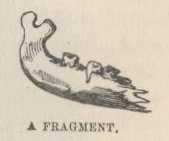
He only said: "Go slow—the old woman won't know any different." [His aunt.]
This person gathers mementoes with a perfect recklessness, now-a-days; mixes them all up together, and then serenely labels them without any regard to truth, propriety, or even plausibility. I have found him breaking a stone in two, and labeling half of it "Chunk busted from the pulpit of Demosthenes," and the other half "Darnick from the Tomb of Abelard and Heloise." I have known him to gather up a handful of pebbles by the roadside, and bring them on board ship and label them as coming from twenty celebrated localities five hundred miles apart. I remonstrate against these outrages upon reason and truth, of course, but it does no good. I get the same tranquil, unanswerable reply every time:
"It don't signify—the old woman won't know any different."
Ever since we three or four fortunate ones made the midnight trip to
Athens, it has afforded him genuine satisfaction to give every body in
the ship a pebble from the Mars-hill where St. Paul preached. He got all
those pebbles on the sea shore, abreast the ship, but professes to have
gathered them from one of our party. However, it is not of any use for
me to expose the deception—it affords him pleasure, and does no harm to
any body. He says he never expects to run out of mementoes of St. Paul
as long as he is in reach of a sand-bank. Well, he is no worse than
others. I notice that all travelers supply deficiencies in their
collections in the same way. I shall never have any confidence in such
things again while I live.
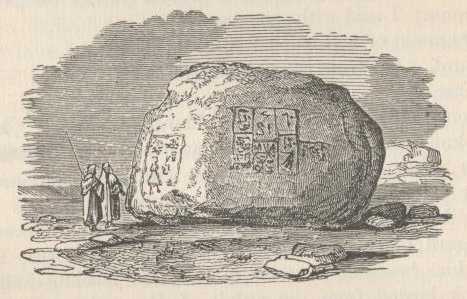
We have got so far east, now—a hundred and fifty-five degrees of longitude from San Francisco—that my watch can not "keep the hang" of the time any more. It has grown discouraged, and stopped. I think it did a wise thing. The difference in time between Sebastopol and the Pacific coast is enormous. When it is six o'clock in the morning here, it is somewhere about week before last in California. We are excusable for getting a little tangled as to time. These distractions and distresses about the time have worried me so much that I was afraid my mind was so much affected that I never would have any appreciation of time again; but when I noticed how handy I was yet about comprehending when it was dinner-time, a blessed tranquillity settled down upon me, and I am tortured with doubts and fears no more.
Odessa is about twenty hours' run from Sebastopol, and is the most northerly port in the Black Sea. We came here to get coal, principally. The city has a population of one hundred and thirty-three thousand, and is growing faster than any other small city out of America. It is a free port, and is the great grain mart of this particular part of the world. Its roadstead is full of ships. Engineers are at work, now, turning the open roadstead into a spacious artificial harbor. It is to be almost inclosed by massive stone piers, one of which will extend into the sea over three thousand feet in a straight line.
I have not felt so much at home for a long time as I did when I "raised the hill" and stood in Odessa for the first time. It looked just like an American city; fine, broad streets, and straight as well; low houses, (two or three stories,) wide, neat, and free from any quaintness of architectural ornamentation; locust trees bordering the sidewalks (they call them acacias;) a stirring, business-look about the streets and the stores; fast walkers; a familiar new look about the houses and every thing; yea, and a driving and smothering cloud of dust that was so like a message from our own dear native land that we could hardly refrain from shedding a few grateful tears and execrations in the old time-honored American way. Look up the street or down the street, this way or that way, we saw only America! There was not one thing to remind us that we were in Russia. We walked for some little distance, reveling in this home vision, and then we came upon a church and a hack-driver, and presto! the illusion vanished! The church had a slender-spired dome that rounded inward at its base, and looked like a turnip turned upside down, and the hackman seemed to be dressed in a long petticoat with out any hoops. These things were essentially foreign, and so were the carriages—but every body knows about these things, and there is no occasion for my describing them.
We were only to stay here a day and a night and take in coal; we consulted the guide-books and were rejoiced to know that there were no sights in Odessa to see; and so we had one good, untrammeled holyday on our hands, with nothing to do but idle about the city and enjoy ourselves. We sauntered through the markets and criticised the fearful and wonderful costumes from the back country; examined the populace as far as eyes could do it; and closed the entertainment with an ice-cream debauch. We do not get ice-cream every where, and so, when we do, we are apt to dissipate to excess. We never cared any thing about ice-cream at home, but we look upon it with a sort of idolatry now that it is so scarce in these red-hot climates of the East.
We only found two pieces of statuary, and this was another blessing. One was a bronze image of the Duc de Richelieu, grand-nephew of the splendid Cardinal. It stood in a spacious, handsome promenade, overlooking the sea, and from its base a vast flight of stone steps led down to the harbor—two hundred of them, fifty feet long, and a wide landing at the bottom of every twenty. It is a noble staircase, and from a distance the people toiling up it looked like insects. I mention this statue and this stairway because they have their story. Richelieu founded Odessa—watched over it with paternal care—labored with a fertile brain and a wise understanding for its best interests—spent his fortune freely to the same end—endowed it with a sound prosperity, and one which will yet make it one of the great cities of the Old World—built this noble stairway with money from his own private purse—and—. Well, the people for whom he had done so much, let him walk down these same steps, one day, unattended, old, poor, without a second coat to his back; and when, years afterwards, he died in Sebastopol in poverty and neglect, they called a meeting, subscribed liberally, and immediately erected this tasteful monument to his memory, and named a great street after him. It reminds me of what Robert Burns' mother said when they erected a stately monument to his memory: "Ah, Robbie, ye asked them for bread and they hae gi'en ye a stane."
The people of Odessa have warmly recommended us to go and call on the
Emperor, as did the Sebastopolians. They have telegraphed his Majesty,
and he has signified his willingness to grant us an audience. So we are
getting up the anchors and preparing to sail to his watering-place. What
a scratching around there will be, now! what a holding of important
meetings and appointing of solemn committees!—and what a furbishing up
of claw-hammer coats and white silk neck-ties! As this fearful ordeal we
are about to pass through pictures itself to my fancy in all its dread
sublimity, I begin to feel my fierce desire to converse with a genuine
Emperor cooling down and passing away. What am I to do with my hands?
What am I to do with my feet? What in the world am I to do with myself?
We anchored here at Yalta, Russia, two or three days ago. To me the place was a vision of the Sierras. The tall, gray mountains that back it, their sides bristling with pines—cloven with ravines—here and there a hoary rock towering into view—long, straight streaks sweeping down from the summit to the sea, marking the passage of some avalanche of former times—all these were as like what one sees in the Sierras as if the one were a portrait of the other. The little village of Yalta nestles at the foot of an amphitheatre which slopes backward and upward to the wall of hills, and looks as if it might have sunk quietly down to its present position from a higher elevation. This depression is covered with the great parks and gardens of noblemen, and through the mass of green foliage the bright colors of their palaces bud out here and there like flowers. It is a beautiful spot.
We had the United States Consul on board—the Odessa Consul. We assembled in the cabin and commanded him to tell us what we must do to be saved, and tell us quickly. He made a speech. The first thing he said fell like a blight on every hopeful spirit: he had never seen a court reception. (Three groans for the Consul.) But he said he had seen receptions at the Governor General's in Odessa, and had often listened to people's experiences of receptions at the Russian and other courts, and believed he knew very well what sort of ordeal we were about to essay. (Hope budded again.) He said we were many; the summer palace was small—a mere mansion; doubtless we should be received in summer fashion—in the garden; we would stand in a row, all the gentlemen in swallow-tail coats, white kids, and white neck-ties, and the ladies in light-colored silks, or something of that kind; at the proper moment—12 meridian—the Emperor, attended by his suite arrayed in splendid uniforms, would appear and walk slowly along the line, bowing to some, and saying two or three words to others. At the moment his Majesty appeared, a universal, delighted, enthusiastic smile ought to break out like a rash among the passengers—a smile of love, of gratification, of admiration—and with one accord, the party must begin to bow—not obsequiously, but respectfully, and with dignity; at the end of fifteen minutes the Emperor would go in the house, and we could run along home again. We felt immensely relieved. It seemed, in a manner, easy. There was not a man in the party but believed that with a little practice he could stand in a row, especially if there were others along; there was not a man but believed he could bow without tripping on his coat tail and breaking his neck; in a word, we came to believe we were equal to any item in the performance except that complicated smile. The Consul also said we ought to draft a little address to the Emperor, and present it to one of his aides-de-camp, who would forward it to him at the proper time. Therefore, five gentlemen were appointed to prepare the document, and the fifty others went sadly smiling about the ship—practicing. During the next twelve hours we had the general appearance, somehow, of being at a funeral, where every body was sorry the death had occurred, but glad it was over—where every body was smiling, and yet broken-hearted.
A committee went ashore to wait on his Excellency the Governor-General, and learn our fate. At the end of three hours of boding suspense, they came back and said the Emperor would receive us at noon the next day—would send carriages for us—would hear the address in person. The Grand Duke Michael had sent to invite us to his palace also. Any man could see that there was an intention here to show that Russia's friendship for America was so genuine as to render even her private citizens objects worthy of kindly attentions.
At the appointed hour we drove out three miles, and assembled in the
handsome garden in front of the Emperor's palace.
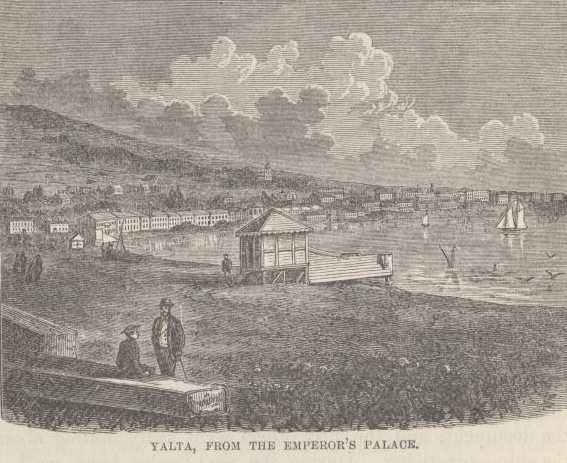
We formed a circle under the trees before the door, for there was no one room in the house able to accommodate our three-score persons comfortably, and in a few minutes the imperial family came out bowing and smiling, and stood in our midst. A number of great dignitaries of the Empire, in undress unit forms, came with them. With every bow, his Majesty said a word of welcome. I copy these speeches. There is character in them—Russian character—which is politeness itself, and the genuine article. The French are polite, but it is often mere ceremonious politeness. A Russian imbues his polite things with a heartiness, both of phrase and expression, that compels belief in their sincerity. As I was saying, the Czar punctuated his speeches with bows:
"Good morning—I am glad to see you—I am gratified—I am delighted—I am
happy to receive you!"
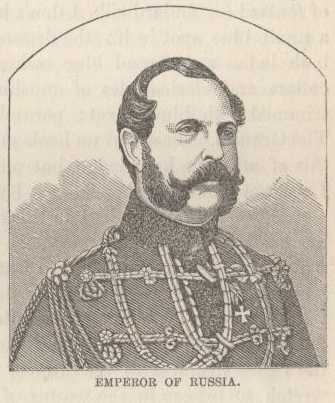
All took off their hats, and the Consul inflicted the address on him. He bore it with unflinching fortitude; then took the rusty-looking document and handed it to some great officer or other, to be filed away among the archives of Russia—in the stove. He thanked us for the address, and said he was very much pleased to see us, especially as such friendly relations existed between Russia and the United States. The Empress said the Americans were favorites in Russia, and she hoped the Russians were similarly regarded in America. These were all the speeches that were made, and I recommend them to parties who present policemen with gold watches, as models of brevity and point. After this the Empress went and talked sociably (for an Empress) with various ladies around the circle; several gentlemen entered into a disjointed general conversation with the Emperor; the Dukes and Princes, Admirals and Maids of Honor dropped into free-and-easy chat with first one and then another of our party, and whoever chose stepped forward and spoke with the modest little Grand Duchess Marie, the Czar's daughter. She is fourteen years old, light-haired, blue-eyed, unassuming and pretty. Every body talks English.
The Emperor wore a cap, frock coat and pantaloons, all of some kind of plain white drilling—cotton or linen and sported no jewelry or any insignia whatever of rank. No costume could be less ostentatious. He is very tall and spare, and a determined-looking man, though a very pleasant-looking one nevertheless. It is easy to see that he is kind and affectionate There is something very noble in his expression when his cap is off. There is none of that cunning in his eye that all of us noticed in Louis Napoleon's.
The Empress and the little Grand Duchess wore simple suits of foulard (or foulard silk, I don't know which is proper,) with a small blue spot in it; the dresses were trimmed with blue; both ladies wore broad blue sashes about their waists; linen collars and clerical ties of muslin; low-crowned straw-hats trimmed with blue velvet; parasols and flesh-colored gloves. The Grand Duchess had no heels on her shoes. I do not know this of my own knowledge, but one of our ladies told me so. I was not looking at her shoes. I was glad to observe that she wore her own hair, plaited in thick braids against the back of her head, instead of the uncomely thing they call a waterfall, which is about as much like a waterfall as a canvas-covered ham is like a cataract. Taking the kind expression that is in the Emperor's face and the gentleness that is in his young daughter's into consideration, I wondered if it would not tax the Czar's firmness to the utmost to condemn a supplicating wretch to misery in the wastes of Siberia if she pleaded for him. Every time their eyes met, I saw more and more what a tremendous power that weak, diffident school-girl could wield if she chose to do it. Many and many a time she might rule the Autocrat of Russia, whose lightest word is law to seventy millions of human beings! She was only a girl, and she looked like a thousand others I have seen, but never a girl provoked such a novel and peculiar interest in me before. A strange, new sensation is a rare thing in this hum-drum life, and I had it here. There was nothing stale or worn out about the thoughts and feelings the situation and the circumstances created. It seemed strange—stranger than I can tell—to think that the central figure in the cluster of men and women, chatting here under the trees like the most ordinary individual in the land, was a man who could open his lips and ships would fly through the waves, locomotives would speed over the plains, couriers would hurry from village to village, a hundred telegraphs would flash the word to the four corners of an Empire that stretches its vast proportions over a seventh part of the habitable globe, and a countless multitude of men would spring to do his bidding. I had a sort of vague desire to examine his hands and see if they were of flesh and blood, like other men's. Here was a man who could do this wonderful thing, and yet if I chose I could knock him down. The case was plain, but it seemed preposterous, nevertheless—as preposterous as trying to knock down a mountain or wipe out a continent. If this man sprained his ankle, a million miles of telegraph would carry the news over mountains—valleys—uninhabited deserts—under the trackless sea—and ten thousand newspapers would prate of it; if he were grievously ill, all the nations would know it before the sun rose again; if he dropped lifeless where he stood, his fall might shake the thrones of half a world! If I could have stolen his coat, I would have done it. When I meet a man like that, I want something to remember him by.
As a general thing, we have been shown through palaces by some plush-legged filagreed flunkey or other, who charged a franc for it; but after talking with the company half an hour, the Emperor of Russia and his family conducted us all through their mansion themselves. They made no charge. They seemed to take a real pleasure in it.
We spent half an hour idling through the palace, admiring the cosy apartments and the rich but eminently home-like appointments of the place, and then the Imperial family bade our party a kind good-bye, and proceeded to count the spoons.
An invitation was extended to us to visit the palace of the eldest son, the Crown Prince of Russia, which was near at hand. The young man was absent, but the Dukes and Countesses and Princes went over the premises with us as leisurely as was the case at the Emperor's, and conversation continued as lively as ever.
It was a little after one o'clock, now. We drove to the Grand Duke Michael's, a mile away, in response to his invitation, previously given.
We arrived in twenty minutes from the Emperor's. It is a lovely place. The beautiful palace nestles among the grand old groves of the park, the park sits in the lap of the picturesque crags and hills, and both look out upon the breezy ocean. In the park are rustic seats, here and there, in secluded nooks that are dark with shade; there are rivulets of crystal water; there are lakelets, with inviting, grassy banks; there are glimpses of sparkling cascades through openings in the wilderness of foliage; there are streams of clear water gushing from mimic knots on the trunks of forest trees; there are miniature marble temples perched upon gray old crags; there are airy lookouts whence one may gaze upon a broad expanse of landscape and ocean. The palace is modeled after the choicest forms of Grecian architecture, and its wide colonnades surround a central court that is banked with rare flowers that fill the place with their fragrance, and in their midst springs a fountain that cools the summer air, and may possibly breed mosquitoes, but I do not think it does.
The Grand Duke and his Duchess came out, and the presentation ceremonies were as simple as they had been at the Emperor's. In a few minutes, conversation was under way, as before. The Empress appeared in the verandah, and the little Grand Duchess came out into the crowd. They had beaten us there. In a few minutes, the Emperor came himself on horseback. It was very pleasant. You can appreciate it if you have ever visited royalty and felt occasionally that possibly you might be wearing out your welcome—though as a general thing, I believe, royalty is not scrupulous about discharging you when it is done with you.
The Grand Duke is the third brother of the Emperor, is about thirty-seven years old, perhaps, and is the princeliest figure in Russia. He is even taller than the Czar, as straight as an Indian, and bears himself like one of those gorgeous knights we read about in romances of the Crusades. He looks like a great-hearted fellow who would pitch an enemy into the river in a moment, and then jump in and risk his life fishing him out again. The stories they tell of him show him to be of a brave and generous nature. He must have been desirous of proving that Americans were welcome guests in the imperial palaces of Russia, because he rode all the way to Yalta and escorted our procession to the Emperor's himself, and kept his aids scurrying about, clearing the road and offering assistance wherever it could be needed. We were rather familiar with him then, because we did not know who he was. We recognized him now, and appreciated the friendly spirit that prompted him to do us a favor that any other Grand Duke in the world would have doubtless declined to do. He had plenty of servitors whom he could have sent, but he chose to attend to the matter himself.
The Grand Duke was dressed in the handsome and showy uniform of a Cossack officer. The Grand Duchess had on a white alpaca robe, with the seams and gores trimmed with black barb lace, and a little gray hat with a feather of the same color. She is young, rather pretty modest and unpretending, and full of winning politeness.
Our party walked all through the house, and then the nobility escorted them all over the grounds, and finally brought them back to the palace about half-past two o'clock to breakfast. They called it breakfast, but we would have called it luncheon. It consisted of two kinds of wine; tea, bread, cheese, and cold meats, and was served on the centre-tables in the reception room and the verandahs—anywhere that was convenient; there was no ceremony. It was a sort of picnic. I had heard before that we were to breakfast there, but Blucher said he believed Baker's boy had suggested it to his Imperial Highness. I think not—though it would be like him. Baker's boy is the famine-breeder of the ship. He is always hungry. They say he goes about the state-rooms when the passengers are out, and eats up all the soap. And they say he eats oakum. They say he will eat any thing he can get between meals, but he prefers oakum. He does not like oakum for dinner, but he likes it for a lunch, at odd hours, or any thing that way. It makes him very disagreeable, because it makes his breath bad, and keeps his teeth all stuck up with tar. Baker's boy may have suggested the breakfast, but I hope he did not. It went off well, anyhow. The illustrious host moved about from place to place, and helped to destroy the provisions and keep the conversation lively, and the Grand Duchess talked with the verandah parties and such as had satisfied their appetites and straggled out from the reception room.
The Grand Duke's tea was delicious. They give one a lemon to squeeze into it, or iced milk, if he prefers it. The former is best. This tea is brought overland from China. It injures the article to transport it by sea.
When it was time to go, we bade our distinguished hosts good-bye, and they retired happy and contented to their apartments to count their spoons.
We had spent the best part of half a day in the home of royalty, and had been as cheerful and comfortable all the time as we could have been in the ship. I would as soon have thought of being cheerful in Abraham's bosom as in the palace of an Emperor. I supposed that Emperors were terrible people. I thought they never did any thing but wear magnificent crowns and red velvet dressing-gowns with dabs of wool sewed on them in spots, and sit on thrones and scowl at the flunkies and the people in the parquette, and order Dukes and Duchesses off to execution. I find, however, that when one is so fortunate as to get behind the scenes and see them at home and in the privacy of their firesides, they are strangely like common mortals. They are pleasanter to look upon then than they are in their theatrical aspect. It seems to come as natural to them to dress and act like other people as it is to put a friend's cedar pencil in your pocket when you are done using it. But I can never have any confidence in the tinsel kings of the theatre after this. It will be a great loss. I used to take such a thrilling pleasure in them. But, hereafter, I will turn me sadly away and say;
"This does not answer—this isn't the style of king that I am acquainted
with."
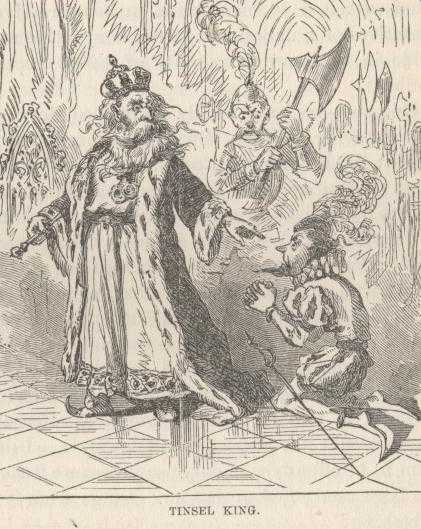
When they swagger around the stage in jeweled crowns and splendid robes, I shall feel bound to observe that all the Emperors that ever I was personally acquainted with wore the commonest sort of clothes, and did not swagger. And when they come on the stage attended by a vast body-guard of supes in helmets and tin breastplates, it will be my duty as well as my pleasure to inform the ignorant that no crowned head of my acquaintance has a soldier any where about his house or his person.
Possibly it may be thought that our party tarried too long, or did other improper things, but such was not the case. The company felt that they were occupying an unusually responsible position—they were representing the people of America, not the Government—and therefore they were careful to do their best to perform their high mission with credit.
On the other hand, the Imperial families, no doubt, considered that in entertaining us they were more especially entertaining the people of America than they could by showering attentions on a whole platoon of ministers plenipotentiary and therefore they gave to the event its fullest significance, as an expression of good will and friendly feeling toward the entire country. We took the kindnesses we received as attentions thus directed, of course, and not to ourselves as a party. That we felt a personal pride in being received as the representatives of a nation, we do not deny; that we felt a national pride in the warm cordiality of that reception, can not be doubted.
Our poet has been rigidly suppressed, from the time we let go the anchor. When it was announced that we were going to visit the Emperor of Russia, the fountains of his great deep were broken up, and he rained ineffable bosh for four-and-twenty hours. Our original anxiety as to what we were going to do with ourselves, was suddenly transformed into anxiety about what we were going to do with our poet. The problem was solved at last. Two alternatives were offered him—he must either swear a dreadful oath that he would not issue a line of his poetry while he was in the Czar's dominions, or else remain under guard on board the ship until we were safe at Constantinople again. He fought the dilemma long, but yielded at last. It was a great deliverance. Perhaps the savage reader would like a specimen of his style. I do not mean this term to be offensive. I only use it because "the gentle reader" has been used so often that any change from it can not but be refreshing:
|
"Save us and sanctify us, and finally, then, See good provisions we enjoy while we journey to Jerusalem. For so man proposes, which it is most true And time will wait for none, nor for us too." |
The sea has been unusually rough all day. However, we have had a lively time of it, anyhow. We have had quite a run of visitors. The Governor-General came, and we received him with a salute of nine guns. He brought his family with him. I observed that carpets were spread from the pier-head to his carriage for him to walk on, though I have seen him walk there without any carpet when he was not on business. I thought may be he had what the accidental insurance people might call an extra-hazardous polish ("policy" joke, but not above mediocrity,) on his boots, and wished to protect them, but I examined and could not see that they were blacked any better than usual. It may have been that he had forgotten his carpet, before, but he did not have it with him, anyhow. He was an exceedingly pleasant old gentleman; we all liked him, especially Blucher. When he went away, Blucher invited him to come again and fetch his carpet along.
Prince Dolgorouki and a Grand Admiral or two, whom we had seen yesterday at the reception, came on board also. I was a little distant with these parties, at first, because when I have been visiting Emperors I do not like to be too familiar with people I only know by reputation, and whose moral characters and standing in society I can not be thoroughly acquainted with. I judged it best to be a little offish, at first. I said to myself, Princes and Counts and Grand Admirals are very well, but they are not Emperors, and one can not be too particular about who he associates with.
Baron Wrangel came, also. He used to be Russian Ambassador at Washington. I told him I had an uncle who fell down a shaft and broke himself in two, as much as a year before that. That was a falsehood, but then I was not going to let any man eclipse me on surprising adventures, merely for the want of a little invention. The Baron is a fine man, and is said to stand high in the Emperor's confidence and esteem.
Baron Ungern-Sternberg, a boisterous, whole-souled old nobleman, came with the rest. He is a man of progress and enterprise—a representative man of the age. He is the Chief Director of the railway system of Russia—a sort of railroad king. In his line he is making things move along in this country He has traveled extensively in America. He says he has tried convict labor on his railroads, and with perfect success. He says the convicts work well, and are quiet and peaceable. He observed that he employs nearly ten thousand of them now.
This appeared to be another call on my resources. I was equal to the emergency. I said we had eighty thousand convicts employed on the railways in America—all of them under sentence of death for murder in the first degree. That closed him out.
We had General Todtleben (the famous defender of Sebastopol, during the
siege,) and many inferior army and also navy officers, and a number of
unofficial Russian ladies and gentlemen. Naturally, a champagne luncheon
was in order, and was accomplished without loss of life. Toasts and
jokes were discharged freely, but no speeches were made save one thanking
the Emperor and the Grand Duke, through the Governor-General, for our
hospitable reception, and one by the Governor-General in reply, in which
he returned the Emperor's thanks for the speech, etc., etc.
We returned to Constantinople, and after a day or two spent in exhausting marches about the city and voyages up the Golden Horn in caiques, we steamed away again. We passed through the Sea of Marmora and the Dardanelles, and steered for a new land—a new one to us, at least—Asia. We had as yet only acquired a bowing acquaintance with it, through pleasure excursions to Scutari and the regions round about.
We passed between Lemnos and Mytilene, and saw them as we had seen Elba and the Balearic Isles—mere bulky shapes, with the softening mists of distance upon them—whales in a fog, as it were. Then we held our course southward, and began to "read up" celebrated Smyrna.
At all hours of the day and night the sailors in the forecastle amused themselves and aggravated us by burlesquing our visit to royalty. The opening paragraph of our Address to the Emperor was framed as follows:
"We are a handful of private citizens of America, traveling simply for recreation—and unostentatiously, as becomes our unofficial state—and, therefore, we have no excuse to tender for presenting ourselves before your Majesty, save the desire of offering our grateful acknowledgments to the lord of a realm, which, through good and through evil report, has been the steadfast friend of the land we love so well."
The third cook, crowned with a resplendent tin basin and wrapped royally
in a table-cloth mottled with grease-spots and coffee stains, and bearing
a sceptre that looked strangely like a belaying-pin, walked upon a
dilapidated carpet and perched himself on the capstan, careless of the
flying spray; his tarred and weather-beaten Chamberlains, Dukes and Lord
High Admirals surrounded him, arrayed in all the pomp that spare
tarpaulins and remnants of old sails could furnish. Then the visiting
"watch below," transformed into graceless ladies and uncouth pilgrims, by
rude travesties upon waterfalls, hoopskirts, white kid gloves and
swallow-tail coats, moved solemnly up the companion way, and bowing low,
began a system of complicated and extraordinary smiling which few
monarchs could look upon and live. Then the mock consul, a
slush-plastered deck-sweep, drew out a soiled fragment of paper and proceeded
to read, laboriously:
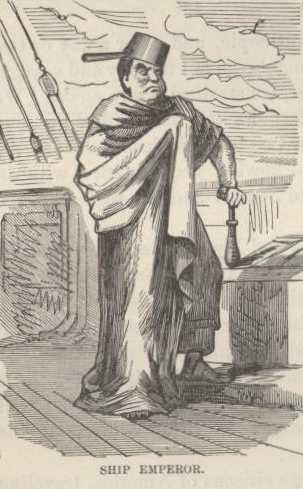
"To His Imperial Majesty, Alexander II., Emperor of Russia:
"We are a handful of private citizens of America, traveling simply for recreation,—and unostentatiously, as becomes our unofficial state—and therefore, we have no excuse to tender for presenting ourselves before your Majesty—"
The Emperor—"Then what the devil did you come for?"
—"Save the desire of offering our grateful acknowledgments to the lord of a realm which—"
The Emperor—"Oh, d—n the Address!—read it to the police.
Chamberlain, take these people over to my brother, the Grand Duke's, and
give them a square meal. Adieu! I am happy—I am gratified—I am
delighted—I am bored. Adieu, adieu—vamos the ranch! The First Groom
of the Palace will proceed to count the portable articles of value
belonging to the premises."
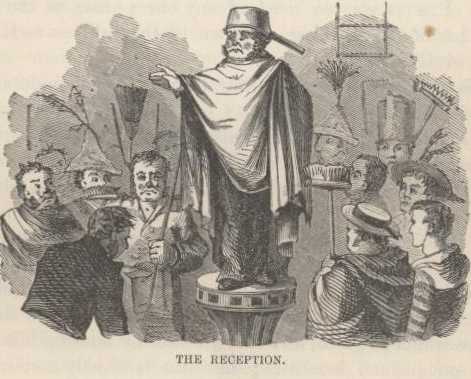
The farce then closed, to be repeated again with every change of the watches, and embellished with new and still more extravagant inventions of pomp and conversation.
At all times of the day and night the phraseology of that tiresome address fell upon our ears. Grimy sailors came down out of the foretop placidly announcing themselves as "a handful of private citizens of America, traveling simply for recreation and unostentatiously," etc.; the coal passers moved to their duties in the profound depths of the ship, explaining the blackness of their faces and their uncouthness of dress, with the reminder that they were "a handful of private citizens, traveling simply for recreation," etc., and when the cry rang through the vessel at midnight: "EIGHT BELLS!—LARBOARD WATCH, TURN OUT!" the larboard watch came gaping and stretching out of their den, with the everlasting formula: "Aye-aye, sir! We are a handful of private citizens of America, traveling simply for recreation, and unostentatiously, as becomes our unofficial state!"
As I was a member of the committee, and helped to frame the Address, these sarcasms came home to me. I never heard a sailor proclaiming himself as a handful of American citizens traveling for recreation, but I wished he might trip and fall overboard, and so reduce his handful by one individual, at least. I never was so tired of any one phrase as the sailors made me of the opening sentence of the Address to the Emperor of Russia.
This seaport of Smyrna, our first notable acquaintance in Asia, is a closely packed city of one hundred and thirty thousand inhabitants, and, like Constantinople, it has no outskirts. It is as closely packed at its outer edges as it is in the centre, and then the habitations leave suddenly off and the plain beyond seems houseless. It is just like any other Oriental city. That is to say, its Moslem houses are heavy and dark, and as comfortless as so many tombs; its streets are crooked, rudely and roughly paved, and as narrow as an ordinary staircase; the streets uniformly carry a man to any other place than the one he wants to go to, and surprise him by landing him in the most unexpected localities; business is chiefly carried on in great covered bazaars, celled like a honeycomb with innumerable shops no larger than a common closet, and the whole hive cut up into a maze of alleys about wide enough to accommodate a laden camel, and well calculated to confuse a stranger and eventually lose him; every where there is dirt, every where there are fleas, every where there are lean, broken-hearted dogs; every alley is thronged with people; wherever you look, your eye rests upon a wild masquerade of extravagant costumes; the workshops are all open to the streets, and the workmen visible; all manner of sounds assail the ear, and over them all rings out the muezzin's cry from some tall minaret, calling the faithful vagabonds to prayer; and superior to the call to prayer, the noises in the streets, the interest of the costumes—superior to every thing, and claiming the bulk of attention first, last, and all the time—is a combination of Mohammedan stenches, to which the smell of even a Chinese quarter would be as pleasant as the roasting odors of the fatted calf to the nostrils of the returning Prodigal. Such is Oriental luxury—such is Oriental splendor! We read about it all our days, but we comprehend it not until we see it. Smyrna is a very old city. Its name occurs several times in the Bible, one or two of the disciples of Christ visited it, and here was located one of the original seven apocalyptic churches spoken of in Revelations. These churches were symbolized in the Scriptures as candlesticks, and on certain conditions there was a sort of implied promise that Smyrna should be endowed with a "crown of life." She was to "be faithful unto death"—those were the terms. She has not kept up her faith straight along, but the pilgrims that wander hither consider that she has come near enough to it to save her, and so they point to the fact that Smyrna to-day wears her crown of life, and is a great city, with a great commerce and full of energy, while the cities wherein were located the other six churches, and to which no crown of life was promised, have vanished from the earth. So Smyrna really still possesses her crown of life, in a business point of view. Her career, for eighteen centuries, has been a chequered one, and she has been under the rule of princes of many creeds, yet there has been no season during all that time, as far as we know, (and during such seasons as she was inhabited at all,) that she has been without her little community of Christians "faithful unto death." Hers was the only church against which no threats were implied in the Revelations, and the only one which survived.
With Ephesus, forty miles from here, where was located another of the seven churches, the case was different. The "candlestick" has been removed from Ephesus. Her light has been put out. Pilgrims, always prone to find prophecies in the Bible, and often where none exist, speak cheerfully and complacently of poor, ruined Ephesus as the victim of prophecy. And yet there is no sentence that promises, without due qualification, the destruction of the city. The words are:
"Remember, therefore, from whence thou art fallen, and repent, and do the first works; or else I will come unto thee quickly, and will remove thy candlestick out of his place, except thou repent."
That is all; the other verses are singularly complimentary to Ephesus. The threat is qualified. There is no history to show that she did not repent. But the cruelest habit the modern prophecy-savans have, is that one of coolly and arbitrarily fitting the prophetic shirt on to the wrong man. They do it without regard to rhyme or reason. Both the cases I have just mentioned are instances in point. Those "prophecies" are distinctly leveled at the "churches of Ephesus, Smyrna," etc., and yet the pilgrims invariably make them refer to the cities instead. No crown of life is promised to the town of Smyrna and its commerce, but to the handful of Christians who formed its "church." If they were "faithful unto death," they have their crown now—but no amount of faithfulness and legal shrewdness combined could legitimately drag the city into a participation in the promises of the prophecy. The stately language of the Bible refers to a crown of life whose lustre will reflect the day-beams of the endless ages of eternity, not the butterfly existence of a city built by men's hands, which must pass to dust with the builders and be forgotten even in the mere handful of centuries vouchsafed to the solid world itself between its cradle and its grave.
The fashion of delving out fulfillments of prophecy where that prophecy consists of mere "ifs," trenches upon the absurd. Suppose, a thousand years from now, a malarious swamp builds itself up in the shallow harbor of Smyrna, or something else kills the town; and suppose, also, that within that time the swamp that has filled the renowned harbor of Ephesus and rendered her ancient site deadly and uninhabitable to-day, becomes hard and healthy ground; suppose the natural consequence ensues, to wit: that Smyrna becomes a melancholy ruin, and Ephesus is rebuilt. What would the prophecy-savans say? They would coolly skip over our age of the world, and say: "Smyrna was not faithful unto death, and so her crown of life was denied her; Ephesus repented, and lo! her candle-stick was not removed. Behold these evidences! How wonderful is prophecy!"
Smyrna has been utterly destroyed six times. If her crown of life had been an insurance policy, she would have had an opportunity to collect on it the first time she fell. But she holds it on sufferance and by a complimentary construction of language which does not refer to her. Six different times, however, I suppose some infatuated prophecy-enthusiast blundered along and said, to the infinite disgust of Smyrna and the Smyrniotes: "In sooth, here is astounding fulfillment of prophecy! Smyrna hath not been faithful unto death, and behold her crown of life is vanished from her head. Verily, these things be astonishing!"
Such things have a bad influence. They provoke worldly men into using light conversation concerning sacred subjects. Thick-headed commentators upon the Bible, and stupid preachers and teachers, work more damage to religion than sensible, cool-brained clergymen can fight away again, toil as they may. It is not good judgment to fit a crown of life upon a city which has been destroyed six times. That other class of wiseacres who twist prophecy in such a manner as to make it promise the destruction and desolation of the same city, use judgment just as bad, since the city is in a very flourishing condition now, unhappily for them. These things put arguments into the mouth of infidelity.
A portion of the city is pretty exclusively Turkish; the Jews have a quarter to themselves; the Franks another quarter; so, also, with the Armenians. The Armenians, of course, are Christians. Their houses are large, clean, airy, handsomely paved with black and white squares of marble, and in the centre of many of them is a square court, which has in it a luxuriant flower-garden and a sparkling fountain; the doors of all the rooms open on this. A very wide hall leads to the street door, and in this the women sit, the most of the day. In the cool of the evening they dress up in their best raiment and show themselves at the door. They are all comely of countenance, and exceedingly neat and cleanly; they look as if they were just out of a band-box. Some of the young ladies—many of them, I may say—are even very beautiful; they average a shade better than American girls—which treasonable words I pray may be forgiven me. They are very sociable, and will smile back when a stranger smiles at them, bow back when he bows, and talk back if he speaks to them. No introduction is required. An hour's chat at the door with a pretty girl one never saw before, is easily obtained, and is very pleasant. I have tried it. I could not talk anything but English, and the girl knew nothing but Greek, or Armenian, or some such barbarous tongue, but we got along very well. I find that in cases like these, the fact that you can not comprehend each other isn't much of a drawback. In that Russia n town of Yalta I danced an astonishing sort of dance an hour long, and one I had not heard of before, with a very pretty girl, and we talked incessantly, and laughed exhaustingly, and neither one ever knew what the other was driving at. But it was splendid. There were twenty people in the set, and the dance was very lively and complicated. It was complicated enough without me—with me it was more so. I threw in a figure now and then that surprised those Russians. But I have never ceased to think of that girl. I have written to her, but I can not direct the epistle because her name is one of those nine-jointed Russian affairs, and there are not letters enough in our alphabet to hold out. I am not reckless enough to try to pronounce it when I am awake, but I make a stagger at it in my dreams, and get up with the lockjaw in the morning. I am fading. I do not take my meals now, with any sort of regularity. Her dear name haunts me still in my dreams. It is awful on teeth. It never comes out of my mouth but it fetches an old snag along with it. And then the lockjaw closes down and nips off a couple of the last syllables—but they taste good.
Coming through the Dardanelles, we saw camel trains on shore with the
glasses, but we were never close to one till we got to Smyrna. These
camels are very much larger than the scrawny specimens one sees in the
menagerie. They stride along these streets, in single file, a dozen in a
train, with heavy loads on their backs, and a fancy-looking negro in
Turkish costume, or an Arab, preceding them on a little donkey and
completely overshadowed and rendered insignificant by the huge beasts.
To see a camel train laden with the spices of Arabia and the rare fabrics
of Persia come marching through the narrow alleys of the bazaar, among
porters with their burdens, money-changers, lamp-merchants, Al-naschars
in the glassware business, portly cross-legged Turks smoking the famous
narghili; and the crowds drifting to and fro in the fanciful costumes of
the East, is a genuine revelation of the Orient.
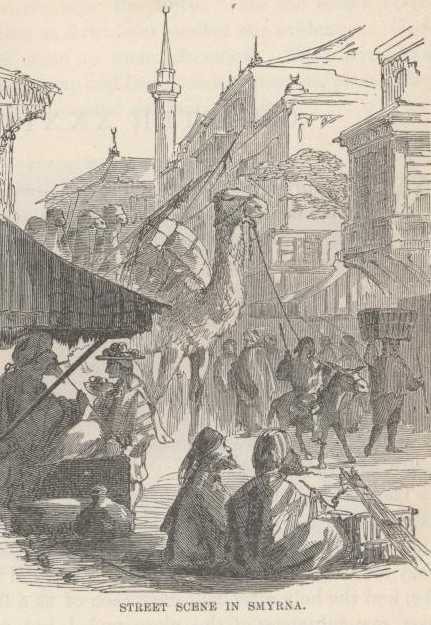
The picture lacks
nothing. It casts you back at once into your forgotten boyhood, and
again you dream over the wonders of the Arabian Nights; again your
companions are princes, your lord is the Caliph Haroun Al Raschid, and
your servants are terrific giants and genii that come with smoke and
lightning and thunder, and go as a storm goes when they depart!
We inquired, and learned that the lions of Smyrna consisted of the ruins
of the ancient citadel, whose broken and prodigious battlements frown
upon the city from a lofty hill just in the edge of the town—the Mount
Pagus of Scripture, they call it; the site of that one of the Seven
Apocalyptic Churches of Asia which was located here in the first century
of the Christian era; and the grave and the place of martyrdom of the
venerable Polycarp, who suffered in Smyrna for his religion some eighteen
hundred years ago.

We took little donkeys and started. We saw Polycarp's tomb, and then hurried on.
The "Seven Churches"—thus they abbreviate it—came next on the list. We rode there—about a mile and a half in the sweltering sun—and visited a little Greek church which they said was built upon the ancient site; and we paid a small fee, and the holy attendant gave each of us a little wax candle as a remembrancer of the place, and I put mine in my hat and the sun melted it and the grease all ran down the back of my neck; and so now I have not any thing left but the wick, and it is a sorry and a wilted-looking wick at that.
Several of us argued as well as we could that the "church" mentioned in the Bible meant a party of Christians, and not a building; that the Bible spoke of them as being very poor—so poor, I thought, and so subject to persecution (as per Polycarp's martyrdom) that in the first place they probably could not have afforded a church edifice, and in the second would not have dared to build it in the open light of day if they could; and finally, that if they had had the privilege of building it, common judgment would have suggested that they build it somewhere near the town. But the elders of the ship's family ruled us down and scouted our evidences. However, retribution came to them afterward. They found that they had been led astray and had gone to the wrong place; they discovered that the accepted site is in the city.
Riding through the town, we could see marks of the six Smyrnas that have existed here and been burned up by fire or knocked down by earthquakes. The hills and the rocks are rent asunder in places, excavations expose great blocks of building-stone that have lain buried for ages, and all the mean houses and walls of modern Smyrna along the way are spotted white with broken pillars, capitals and fragments of sculptured marble that once adorned the lordly palaces that were the glory of the city in the olden time.
The ascent of the hill of the citadel is very steep, and we proceeded rather slowly. But there were matters of interest about us. In one place, five hundred feet above the sea, the perpendicular bank on the upper side of the road was ten or fifteen feet high, and the cut exposed three veins of oyster shells, just as we have seen quartz veins exposed in the cutting of a road in Nevada or Montana. The veins were about eighteen inches thick and two or three feet apart, and they slanted along downward for a distance of thirty feet or more, and then disappeared where the cut joined the road. Heaven only knows how far a man might trace them by "stripping." They were clean, nice oyster shells, large, and just like any other oyster shells. They were thickly massed together, and none were scattered above or below the veins. Each one was a well-defined lead by itself, and without a spur. My first instinct was to set up the usual—
NOTICE
"We, the undersigned, claim five claims of two hundred feet each, (and one for discovery,) on this ledge or lode of oyster-shells, with all its dips, spurs, angles, variations and sinuosities, and fifty feet on each side of the same, to work it, etc., etc., according to the mining laws of Smyrna."
They were such perfectly natural-looking leads that I could hardly keep from "taking them up." Among the oyster-shells were mixed many fragments of ancient, broken crockery ware. Now how did those masses of oyster-shells get there? I can not determine. Broken crockery and oyster-shells are suggestive of restaurants—but then they could have had no such places away up there on that mountain side in our time, because nobody has lived up there. A restaurant would not pay in such a stony, forbidding, desolate place. And besides, there were no champagne corks among the shells. If there ever was a restaurant there, it must have been in Smyrna's palmy days, when the hills were covered with palaces. I could believe in one restaurant, on those terms; but then how about the three? Did they have restaurants there at three different periods of the world?—because there are two or three feet of solid earth between the oyster leads. Evidently, the restaurant solution will not answer.
The hill might have been the bottom of the sea, once, and been lifted up, with its oyster-beds, by an earthquake—but, then, how about the crockery? And moreover, how about three oyster beds, one above another, and thick strata of good honest earth between?
That theory will not do. It is just possible that this hill is Mount Ararat, and that Noah's Ark rested here, and he ate oysters and threw the shells overboard. But that will not do, either. There are the three layers again and the solid earth between—and, besides, there were only eight in Noah's family, and they could not have eaten all these oysters in the two or three months they staid on top of that mountain. The beasts—however, it is simply absurd to suppose he did not know any more than to feed the beasts on oyster suppers.
It is painful—it is even humiliating—but I am reduced at last to one slender theory: that the oysters climbed up there of their own accord. But what object could they have had in view?—what did they want up there? What could any oyster want to climb a hill for? To climb a hill must necessarily be fatiguing and annoying exercise for an oyster. The most natural conclusion would be that the oysters climbed up there to look at the scenery. Yet when one comes to reflect upon the nature of an oyster, it seems plain that he does not care for scenery. An oyster has no taste for such things; he cares nothing for the beautiful. An oyster is of a retiring disposition, and not lively—not even cheerful above the average, and never enterprising. But above all, an oyster does not take any interest in scenery—he scorns it. What have I arrived at now? Simply at the point I started from, namely, those oyster shells are there, in regular layers, five hundred feet above the sea, and no man knows how they got there. I have hunted up the guide-books, and the gist of what they say is this: "They are there, but how they got there is a mystery."
Twenty-five years ago, a multitude of people in America put on their
ascension robes, took a tearful leave of their friends, and made ready to
fly up into heaven at the first blast of the trumpet. But the angel did
not blow it. Miller's resurrection day was a failure. The Millerites
were disgusted. I did not suspect that there were Millers in Asia Minor,
but a gentleman tells me that they had it all set for the world to come
to an end in Smyrna one day about three years ago.
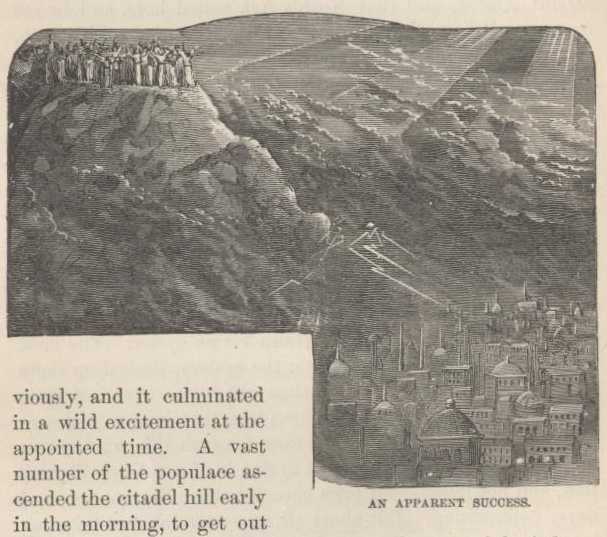
There was much buzzing and preparation for a long time previously, and it culminated in a wild excitement at the appointed time. A vast number of the populace ascended the citadel hill early in the morning, to get out of the way of the general destruction, and many of the infatuated closed up their shops and retired from all earthly business. But the strange part of it was that about three in the afternoon, while this gentleman and his friends were at dinner in the hotel, a terrific storm of rain, accompanied by thunder and lightning, broke forth and continued with dire fury for two or three hours. It was a thing unprecedented in Smyrna at that time of the year, and scared some of the most skeptical. The streets ran rivers and the hotel floor was flooded with water. The dinner had to be suspended. When the storm finished and left every body drenched through and through, and melancholy and half-drowned, the ascensionists came down from the mountain as dry as so many charity-sermons! They had been looking down upon the fearful storm going on below, and really believed that their proposed destruction of the world was proving a grand success.
A railway here in Asia—in the dreamy realm of the Orient—in the fabled land of the Arabian Nights—is a strange thing to think of. And yet they have one already, and are building another. The present one is well built and well conducted, by an English Company, but is not doing an immense amount of business. The first year it carried a good many passengers, but its freight list only comprised eight hundred pounds of figs!
It runs almost to the very gates of Ephesus—a town great in all ages of the world—a city familiar to readers of the Bible, and one which was as old as the very hills when the disciples of Christ preached in its streets. It dates back to the shadowy ages of tradition, and was the birthplace of gods renowned in Grecian mythology. The idea of a locomotive tearing through such a place as this, and waking the phantoms of its old days of romance out of their dreams of dead and gone centuries, is curious enough.
We journey thither tomorrow to see the celebrated ruins.
This has been a stirring day. The Superintendent of the railway put a train at our disposal, and did us the further kindness of accompanying us to Ephesus and giving to us his watchful care. We brought sixty scarcely perceptible donkeys in the freight cars, for we had much ground to go over. We have seen some of the most grotesque costumes, along the line of the railroad, that can be imagined. I am glad that no possible combination of words could describe them, for I might then be foolish enough to attempt it.
At ancient Ayassalook, in the midst of a forbidding desert, we came upon long lines of ruined aqueducts, and other remnants of architectural grandeur, that told us plainly enough we were nearing what had been a metropolis, once. We left the train and mounted the donkeys, along with our invited guests—pleasant young gentlemen from the officers' list of an American man-of-war.
The little donkeys had saddles upon them which were made very high in
order that the rider's feet might not drag the ground. The preventative
did not work well in the cases of our tallest pilgrims, however. There
were no bridles—nothing but a single rope, tied to the bit. It was
purely ornamental, for the donkey cared nothing for it.
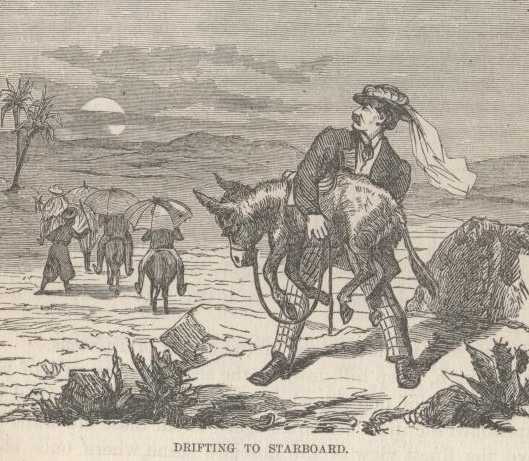
If he were
drifting to starboard, you might put your helm down hard the other way,
if it were any satisfaction to you to do it, but he would continue to
drift to starboard all the same. There was only one process which could
be depended on, and it was to get down and lift his rear around until his
head pointed in the right direction, or take him under your arm and carry
him to a part of the road which he could not get out of without climbing.
The sun flamed down as hot as a furnace, and neck-scarfs, veils and
umbrellas seemed hardly any protection; they served only to make the long
procession look more than ever fantastic—for be it known the ladies were
all riding astride because they could not stay on the shapeless saddles
sidewise, the men were perspiring and out of temper, their feet were
banging against the rocks, the donkeys were capering in every direction
but the right one and being belabored with clubs for it, and every now
and then a broad umbrella would suddenly go down out of the cavalcade,
announcing to all that one more pilgrim had bitten the dust. It was a
wilder picture than those solitudes had seen for many a day. No donkeys
ever existed that were as hard to navigate as these, I think, or that had
so many vile, exasperating instincts. Occasionally we grew so tired and
breathless with fighting them that we had to desist,—and immediately the
donkey would come down to a deliberate walk. This, with the fatigue, and
the sun, would put a man asleep; and soon as the man was asleep, the
donkey would lie down. My donkey shall never see his boyhood's home
again. He has lain down once too often. He must die.
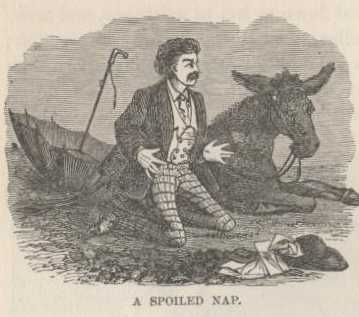
We all stood in the vast theatre of ancient Ephesus,—the stone-benched amphitheatre I mean—and had our picture taken. We looked as proper there as we would look any where, I suppose. We do not embellish the general desolation of a desert much. We add what dignity we can to a stately ruin with our green umbrellas and jackasses, but it is little. However, we mean well.
I wish to say a brief word of the aspect of Ephesus.
On a high, steep hill, toward the sea, is a gray ruin of ponderous blocks of marble, wherein, tradition says, St. Paul was imprisoned eighteen centuries ago. From these old walls you have the finest view of the desolate scene where once stood Ephesus, the proudest city of ancient times, and whose Temple of Diana was so noble in design, and so exquisite of workmanship, that it ranked high in the list of the Seven Wonders of the World.
Behind you is the sea; in front is a level green valley, (a marsh, in
fact,) extending far away among the mountains; to the right of the front
view is the old citadel of Ayassalook, on a high hill; the ruined Mosque
of the Sultan Selim stands near it in the plain, (this is built over the
grave of St. John, and was formerly Christian Church); further toward
you is the hill of Pion, around whose front is clustered all that remains
of the ruins of Ephesus that still stand; divided from it by a narrow
valley is the long, rocky, rugged mountain of Coressus. The scene is a
pretty one, and yet desolate—for in that wide plain no man can live, and
in it is no human habitation. But for the crumbling arches and monstrous
piers and broken walls that rise from the foot of the hill of Pion, one
could not believe that in this place once stood a city whose renown is
older than tradition itself.
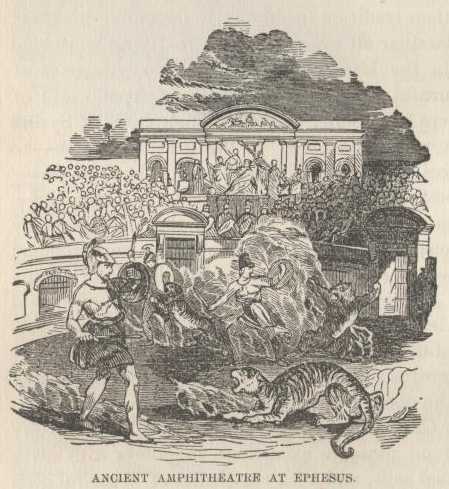
It is incredible to reflect that things as familiar all over the world to-day as household words, belong in the history and in the shadowy legends of this silent, mournful solitude. We speak of Apollo and of Diana—they were born here; of the metamorphosis of Syrinx into a reed—it was done here; of the great god Pan—he dwelt in the caves of this hill of Coressus; of the Amazons—this was their best prized home; of Bacchus and Hercules both fought the warlike women here; of the Cyclops—they laid the ponderous marble blocks of some of the ruins yonder; of Homer—this was one of his many birthplaces; of Cirmon of Athens; of Alcibiades, Lysander, Agesilaus—they visited here; so did Alexander the Great; so did Hannibal and Antiochus, Scipio, Lucullus and Sylla; Brutus, Cassius, Pompey, Cicero, and Augustus; Antony was a judge in this place, and left his seat in the open court, while the advocates were speaking, to run after Cleopatra, who passed the door; from this city these two sailed on pleasure excursions, in galleys with silver oars and perfumed sails, and with companies of beautiful girls to serve them, and actors and musicians to amuse them; in days that seem almost modern, so remote are they from the early history of this city, Paul the Apostle preached the new religion here, and so did John, and here it is supposed the former was pitted against wild beasts, for in 1 Corinthians, xv. 32 he says:
when many men still lived who had seen the Christ; here Mary Magdalen died, and here the Virgin Mary ended her days with John, albeit Rome has since judged it best to locate her grave elsewhere; six or seven hundred years ago—almost yesterday, as it were—troops of mail-clad Crusaders thronged the streets; and to come down to trifles, we speak of meandering streams, and find a new interest in a common word when we discover that the crooked river Meander, in yonder valley, gave it to our dictionary. It makes me feel as old as these dreary hills to look down upon these moss-hung ruins, this historic desolation. One may read the Scriptures and believe, but he can not go and stand yonder in the ruined theatre and in imagination people it again with the vanished multitudes who mobbed Paul's comrades there and shouted, with one voice, "Great is Diana of the Ephesians!" The idea of a shout in such a solitude as this almost makes one shudder.
It was a wonderful city, this Ephesus. Go where you will about these
broad plains, you find the most exquisitely sculptured marble fragments
scattered thick among the dust and weeds; and protruding from the ground,
or lying prone upon it, are beautiful fluted columns of porphyry and all
precious marbles; and at every step you find elegantly carved capitals
and massive bases, and polished tablets engraved with Greek inscriptions.
It is a world of precious relics, a wilderness of marred and mutilated
gems. And yet what are these things to the wonders that lie buried here
under the ground? At Constantinople, at Pisa, in the cities of Spain,
are great mosques and cathedrals, whose grandest columns came from the
temples and palaces of Ephesus, and yet one has only to scratch the
ground here to match them. We shall never know what magnificence is,
until this imperial city is laid bare to the sun.
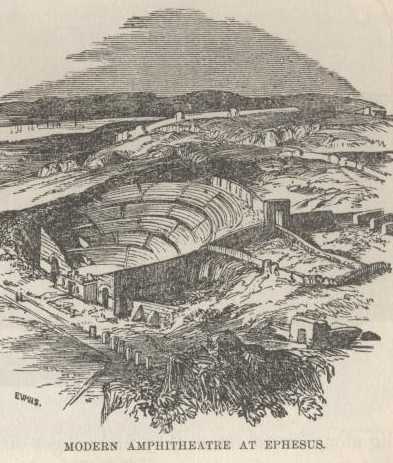
The finest piece of sculpture we have yet seen and the one that impressed us most, (for we do not know much about art and can not easily work up ourselves into ecstasies over it,) is one that lies in this old theatre of Ephesus which St. Paul's riot has made so celebrated. It is only the headless body of a man, clad in a coat of mail, with a Medusa head upon the breast-plate, but we feel persuaded that such dignity and such majesty were never thrown into a form of stone before.
What builders they were, these men of antiquity! The massive arches of
some of these ruins rest upon piers that are fifteen feet square and
built entirely of solid blocks of marble, some of which are as large as a
Saratoga trunk, and some the size of a boarding-house sofa. They are not
shells or shafts of stone filled inside with rubbish, but the whole pier
is a mass of solid masonry. Vast arches, that may have been the gates of
the city, are built in the same way. They have braved the storms and
sieges of three thousand years, and have been shaken by many an
earthquake, but still they stand. When they dig alongside of them, they
find ranges of ponderous masonry that are as perfect in every detail as
they were the day those old Cyclopian giants finished them. An English
Company is going to excavate Ephesus—and then!
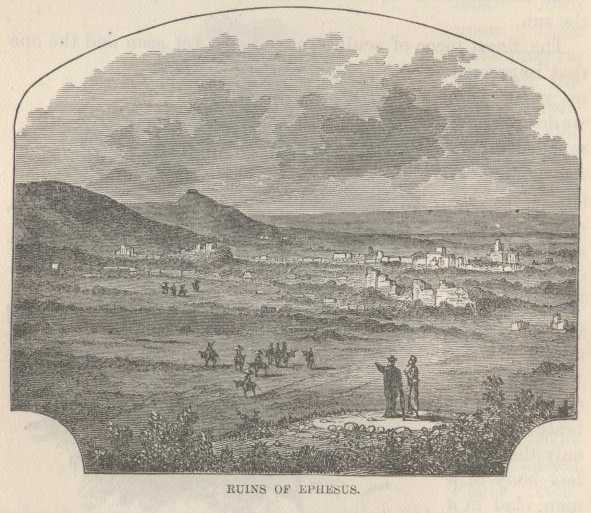
And now am I reminded of—
In the Mount of Pion, yonder, is the Cave of the Seven Sleepers. Once
upon a time, about fifteen hundred years ago, seven young men lived near
each other in Ephesus, who belonged to the despised sect of the
Christians. It came to pass that the good King Maximilianus, (I am
telling this story for nice little boys and girls,) it came to pass, I
say, that the good King Maximilianus fell to persecuting the Christians,
and as time rolled on he made it very warm for them. So the seven young
men said one to the other, let us get up and travel. And they got up and
traveled. They tarried not to bid their fathers and mothers good-bye, or
any friend they knew. They only took certain moneys which their parents
had, and garments that belonged unto their friends, whereby they might
remember them when far away; and they took also the dog Ketmehr, which
was the property of their neighbor Malchus, because the beast did run his
head into a noose which one of the young men was carrying carelessly, and
they had not time to release him; and they took also certain chickens
that seemed lonely in the neighboring coops, and likewise some bottles of
curious liquors that stood near the grocer's window; and then they
departed from the city.
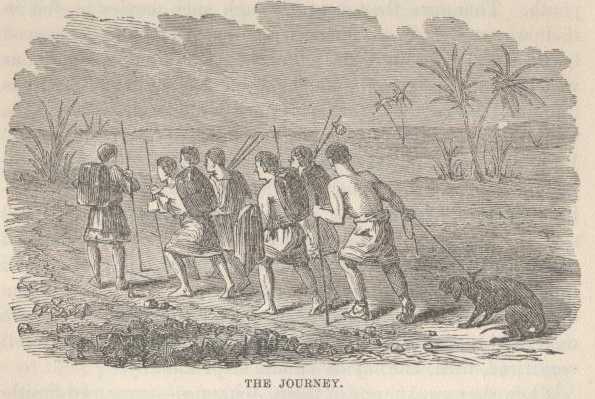
By-and-by they came to a marvelous cave in the Hill of Pion and entered into it and feasted, and presently they hurried on again. But they forgot the bottles of curious liquors, and left them behind. They traveled in many lands, and had many strange adventures. They were virtuous young men, and lost no opportunity that fell in their way to make their livelihood. Their motto was in these words, namely, "Procrastination is the thief of time." And so, whenever they did come upon a man who was alone, they said, Behold, this person hath the wherewithal—let us go through him. And they went through him. At the end of five years they had waxed tired of travel and adventure, and longed to revisit their old home again and hear the voices and see the faces that were dear unto their youth. Therefore they went through such parties as fell in their way where they sojourned at that time, and journeyed back toward Ephesus again. For the good King Maximilianus was become converted unto the new faith, and the Christians rejoiced because they were no longer persecuted. One day as the sun went down, they came to the cave in the Mount of Pion, and they said, each to his fellow, Let us sleep here, and go and feast and make merry with our friends when the morning cometh. And each of the seven lifted up his voice and said, It is a whiz. So they went in, and lo, where they had put them, there lay the bottles of strange liquors, and they judged that age had not impaired their excellence. Wherein the wanderers were right, and the heads of the same were level. So each of the young men drank six bottles, and behold they felt very tired, then, and lay down and slept soundly.
When they awoke, one of them, Johannes—surnamed Smithianus—said, We are naked. And it was so. Their raiment was all gone, and the money which they had gotten from a stranger whom they had proceeded through as they approached the city, was lying upon the ground, corroded and rusted and defaced. Likewise the dog Ketmehr was gone, and nothing save the brass that was upon his collar remained. They wondered much at these things. But they took the money, and they wrapped about their bodies some leaves, and came up to the top of the hill. Then were they perplexed. The wonderful temple of Diana was gone; many grand edifices they had never seen before stood in the city; men in strange garbs moved about the streets, and every thing was changed.
Johannes said, It hardly seems like Ephesus. Yet here is the great gymnasium; here is the mighty theatre, wherein I have seen seventy thousand men assembled; here is the Agora; there is the font where the sainted John the Baptist immersed the converts; yonder is the prison of the good St. Paul, where we all did use to go to touch the ancient chains that bound him and be cured of our distempers; I see the tomb of the disciple Luke, and afar off is the church wherein repose the ashes of the holy John, where the Christians of Ephesus go twice a year to gather the dust from the tomb, which is able to make bodies whole again that are corrupted by disease, and cleanse the soul from sin; but see how the wharves encroach upon the sea, and what multitudes of ships are anchored in the bay; see, also, how the city hath stretched abroad, far over the valley behind Pion, and even unto the walls of Ayassalook; and lo, all the hills are white with palaces and ribbed with colonnades of marble. How mighty is Ephesus become!
And wondering at what their eyes had seen, they went down into the city and purchased garments and clothed themselves. And when they would have passed on, the merchant bit the coins which they had given him, with his teeth, and turned them about and looked curiously upon them, and cast them upon his counter, and listened if they rang; and then he said, These be bogus. And they said, Depart thou to Hades, and went their way. When they were come to their houses, they recognized them, albeit they seemed old and mean; and they rejoiced, and were glad. They ran to the doors, and knocked, and strangers opened, and looked inquiringly upon them. And they said, with great excitement, while their hearts beat high, and the color in their faces came and went, Where is my father? Where is my mother? Where are Dionysius and Serapion, and Pericles, and Decius? And the strangers that opened said, We know not these. The Seven said, How, you know them not? How long have ye dwelt here, and whither are they gone that dwelt here before ye? And the strangers said, Ye play upon us with a jest, young men; we and our fathers have sojourned under these roofs these six generations; the names ye utter rot upon the tombs, and they that bore them have run their brief race, have laughed and sung, have borne the sorrows and the weariness that were allotted them, and are at rest; for nine-score years the summers have come and gone, and the autumn leaves have fallen, since the roses faded out of their cheeks and they laid them to sleep with the dead.
Then the seven young men turned them away from their homes, and the strangers shut the doors upon them. The wanderers marveled greatly, and looked into the faces of all they met, as hoping to find one that they knew; but all were strange, and passed them by and spake no friendly word. They were sore distressed and sad. Presently they spake unto a citizen and said, Who is King in Ephesus? And the citizen answered and said, Whence come ye that ye know not that great Laertius reigns in Ephesus? They looked one at the other, greatly perplexed, and presently asked again, Where, then, is the good King Maximilianus? The citizen moved him apart, as one who is afraid, and said, Verily these men be mad, and dream dreams, else would they know that the King whereof they speak is dead above two hundred years agone.
Then the scales fell from the eyes of the Seven, and one said, Alas, that we drank of the curious liquors. They have made us weary, and in dreamless sleep these two long centuries have we lain. Our homes are desolate, our friends are dead. Behold, the jig is up—let us die. And that same day went they forth and laid them down and died. And in that self-same day, likewise, the Seven-up did cease in Ephesus, for that the Seven that were up were down again, and departed and dead withal. And the names that be upon their tombs, even unto this time, are Johannes Smithianus, Trumps, Gift, High, and Low, Jack, and The Game. And with the sleepers lie also the bottles wherein were once the curious liquors: and upon them is writ, in ancient letters, such words as these—Dames of heathen gods of olden time, perchance: Rumpunch, Jinsling, Egnog.
Such is the story of the Seven Sleepers, (with slight variations,) and I
know it is true, because I have seen the cave myself.
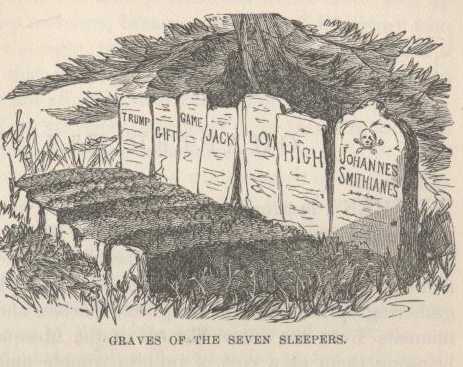
Really, so firm a faith had the ancients this legend, that as late as
eight or nine hundred years ago, learned travelers held it in
superstitious fear. Two of them record that they ventured into it, but
ran quickly out again, not daring to tarry lest they should fall asleep
and outlive their great grand-children a century or so. Even at this day
the ignorant denizens of the neighboring country prefer not to sleep in
it.
| Previous Part | Main Index | Next Part |